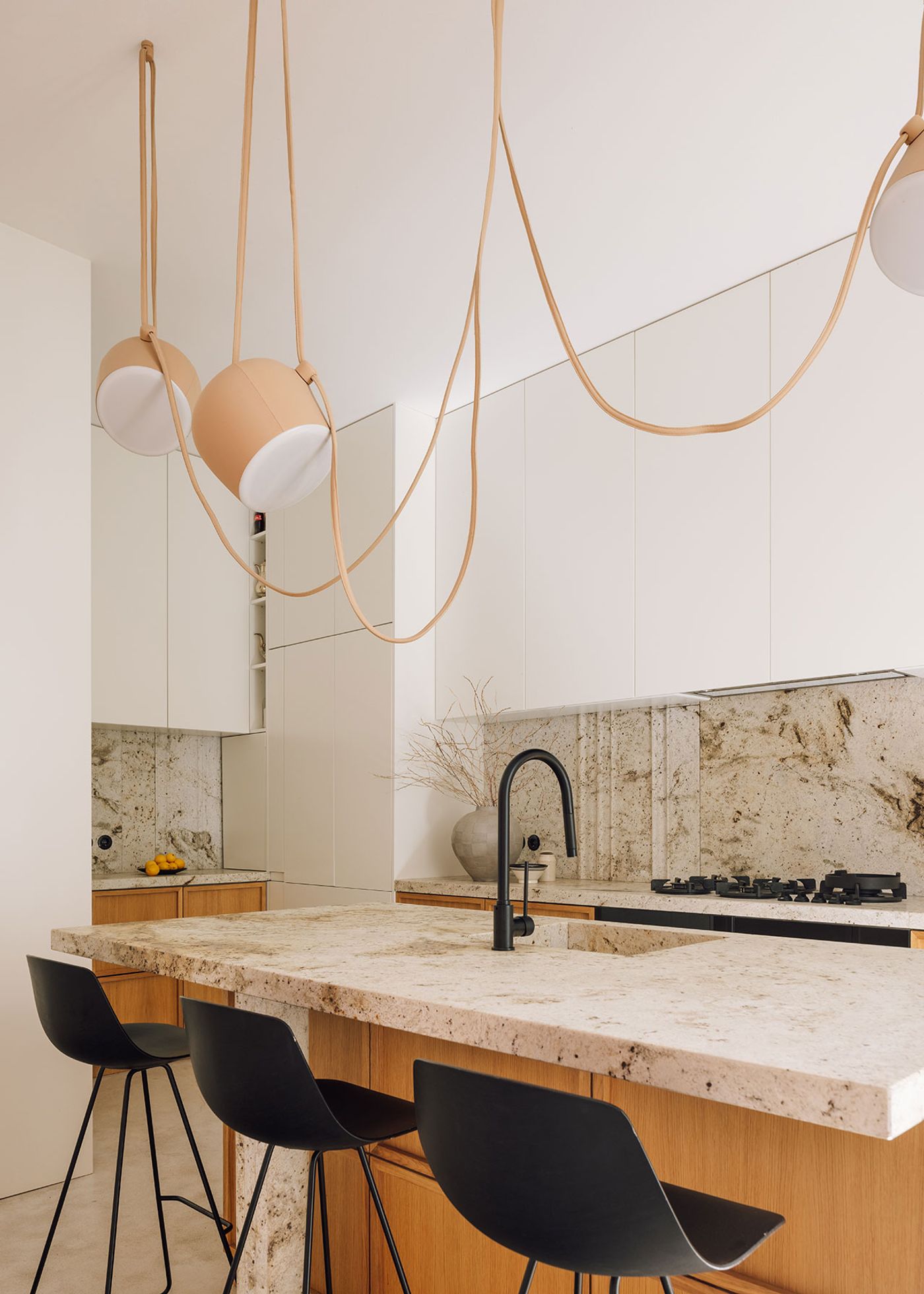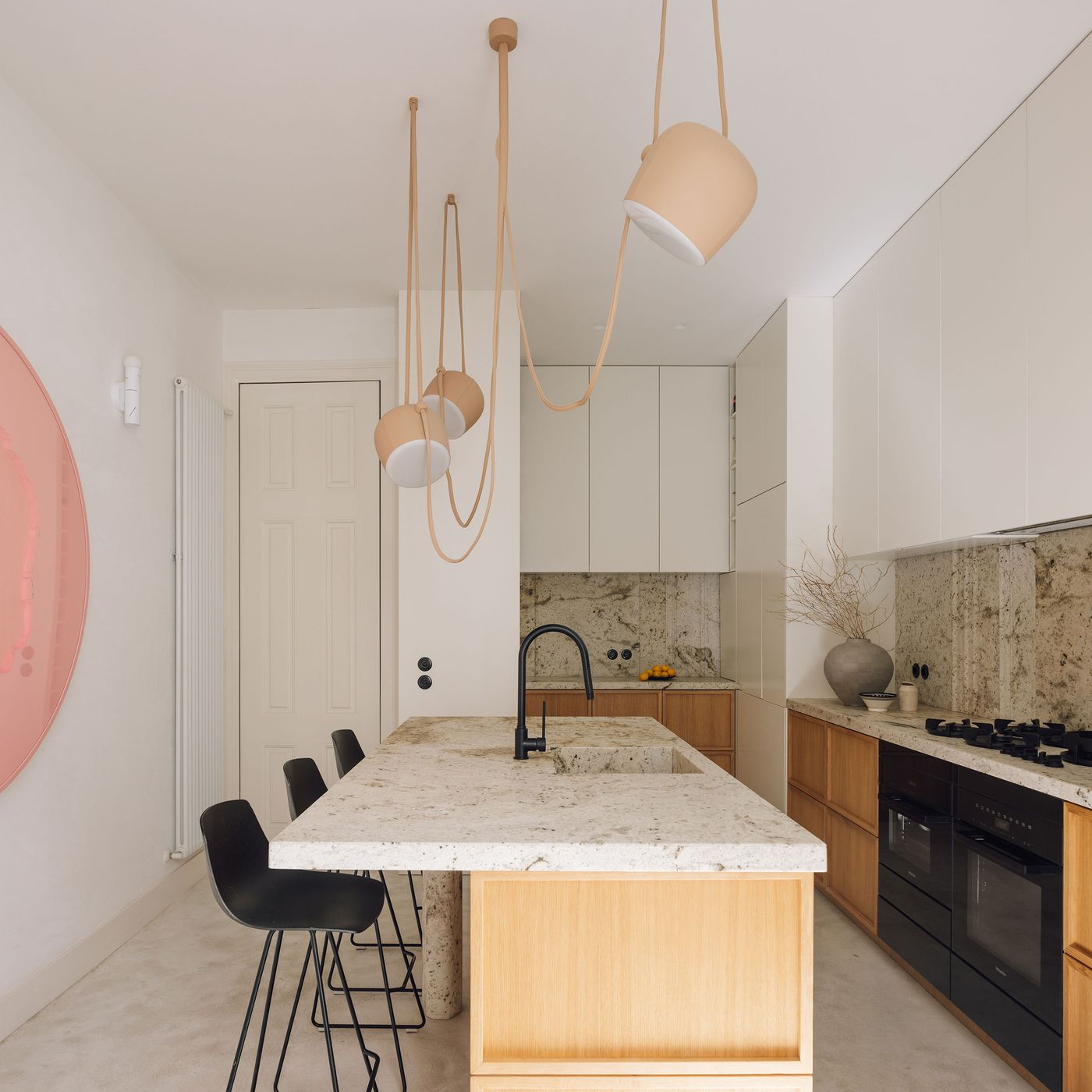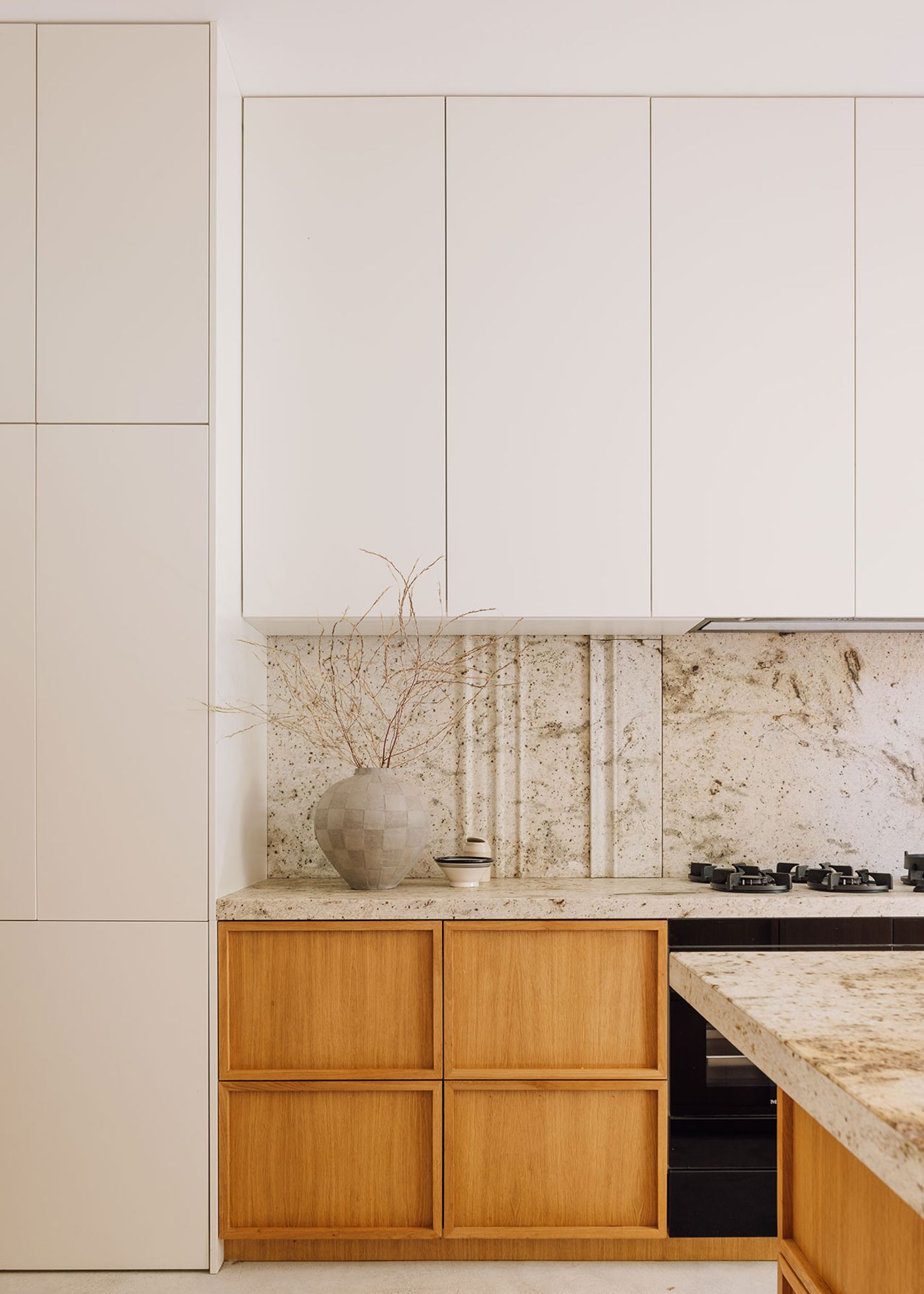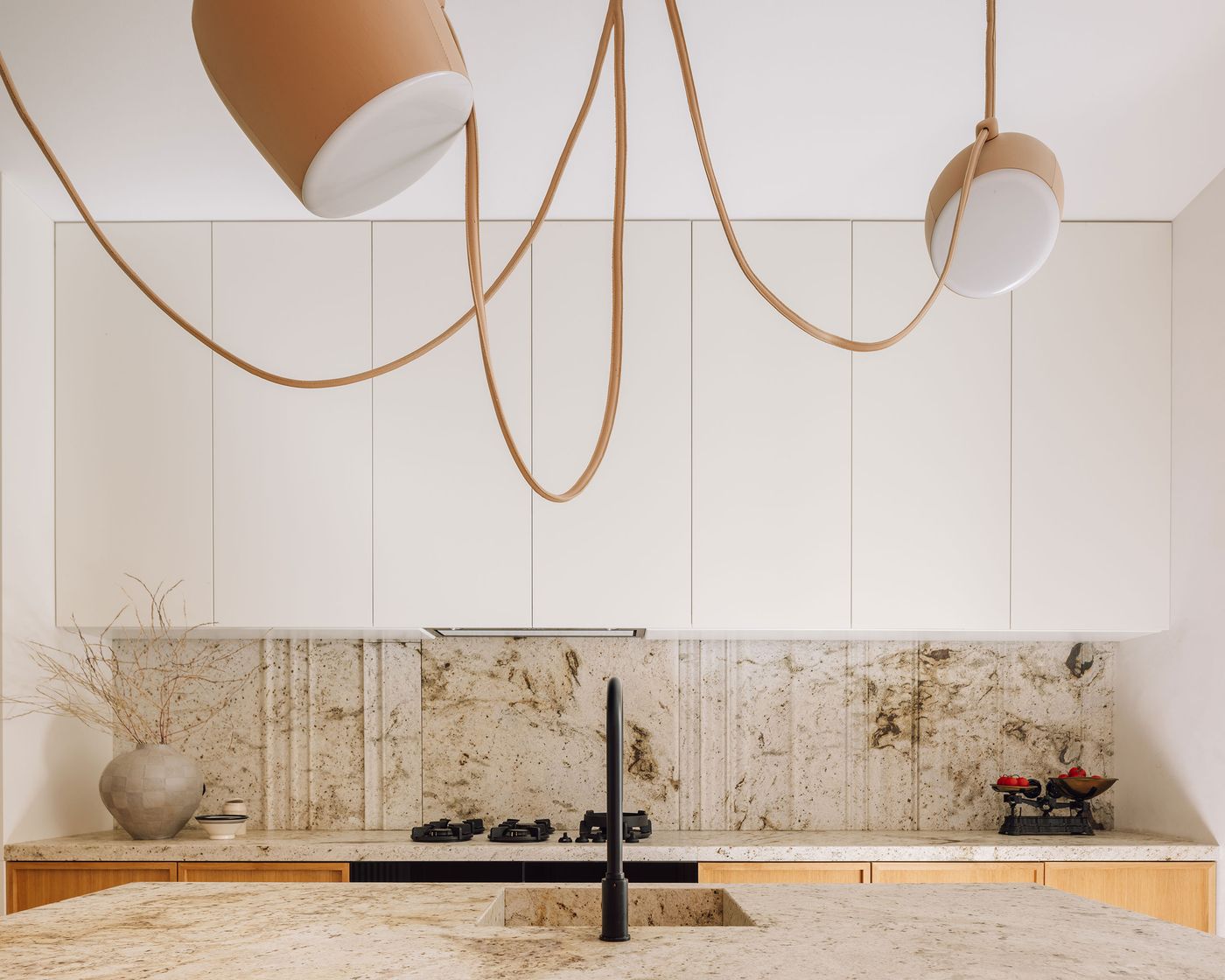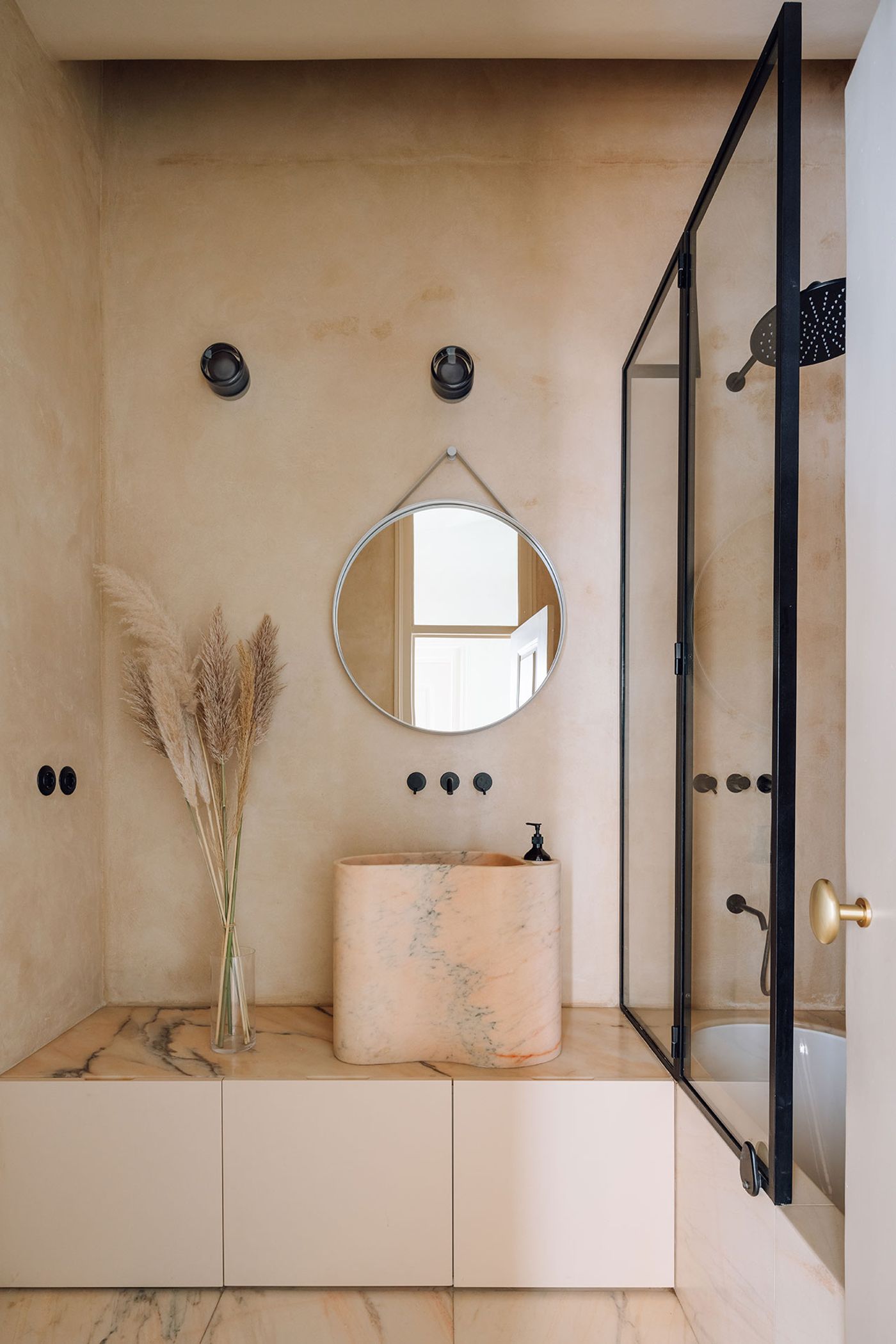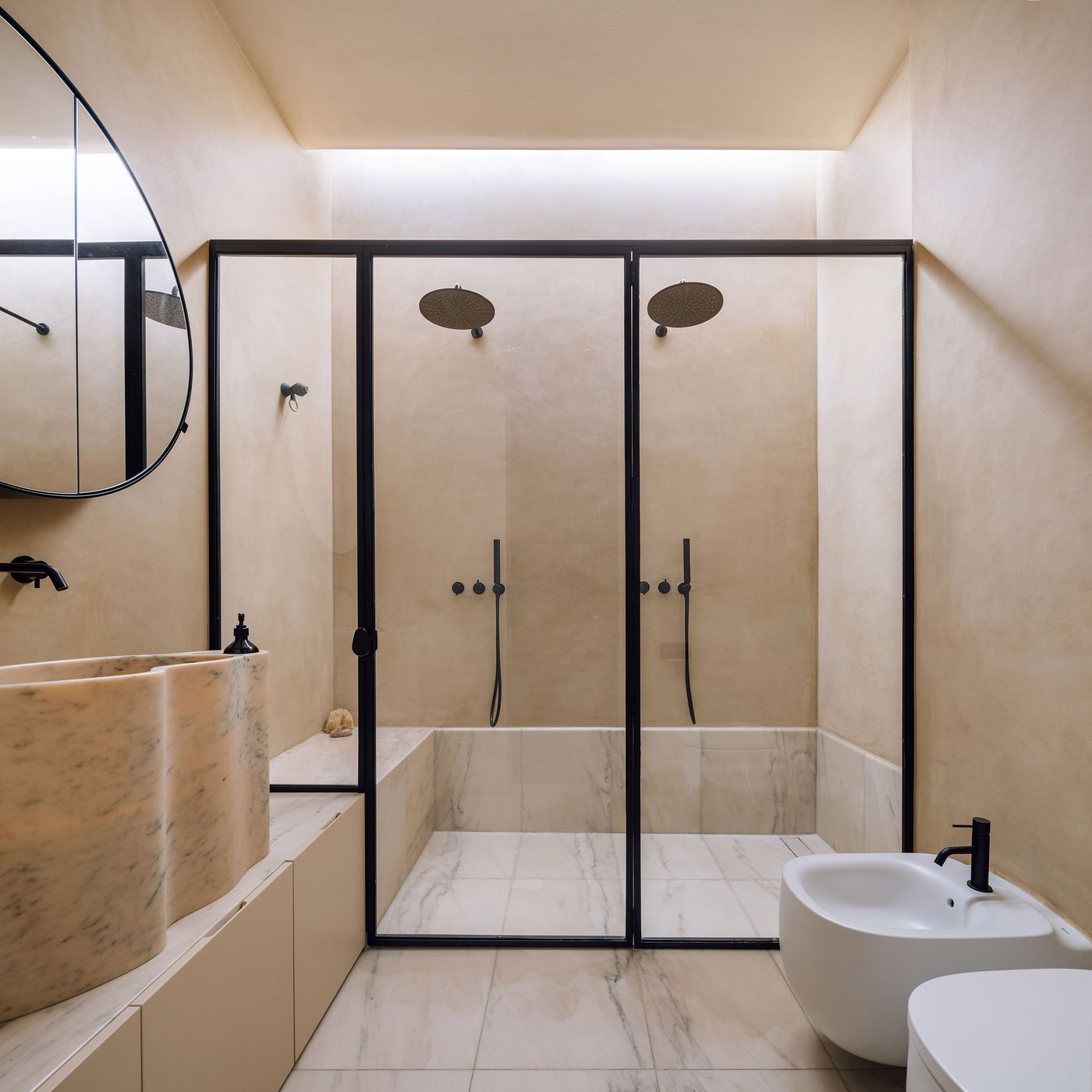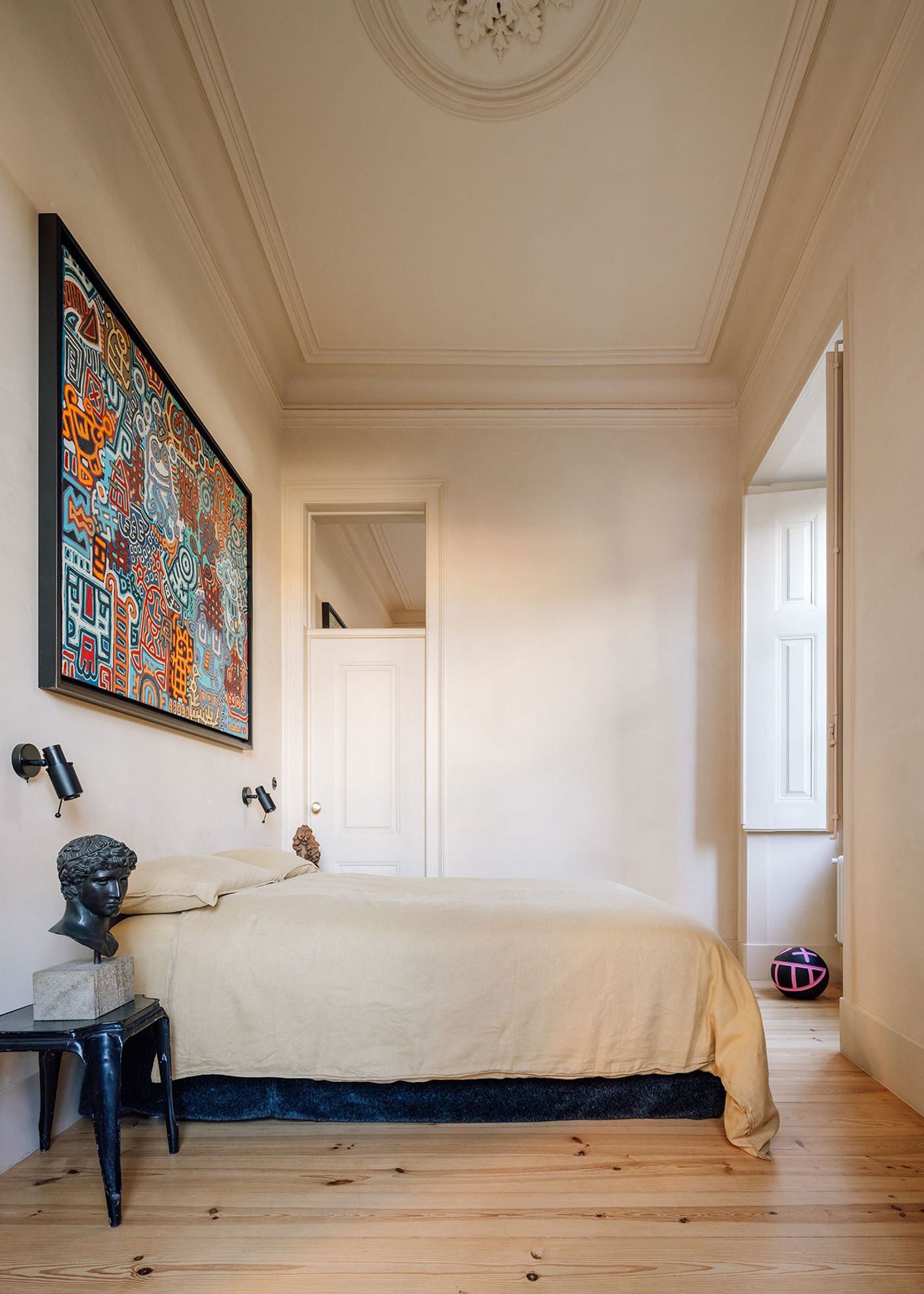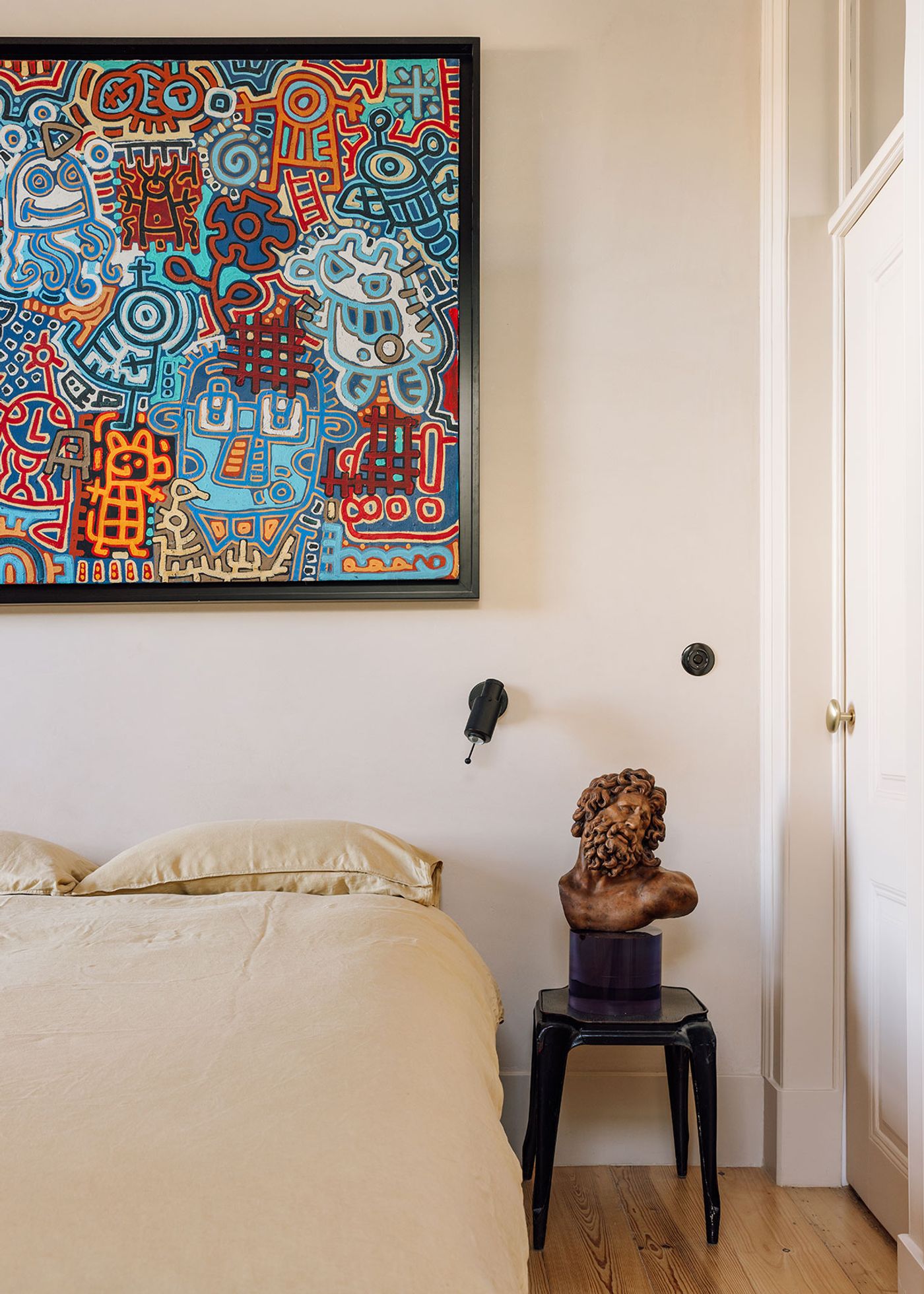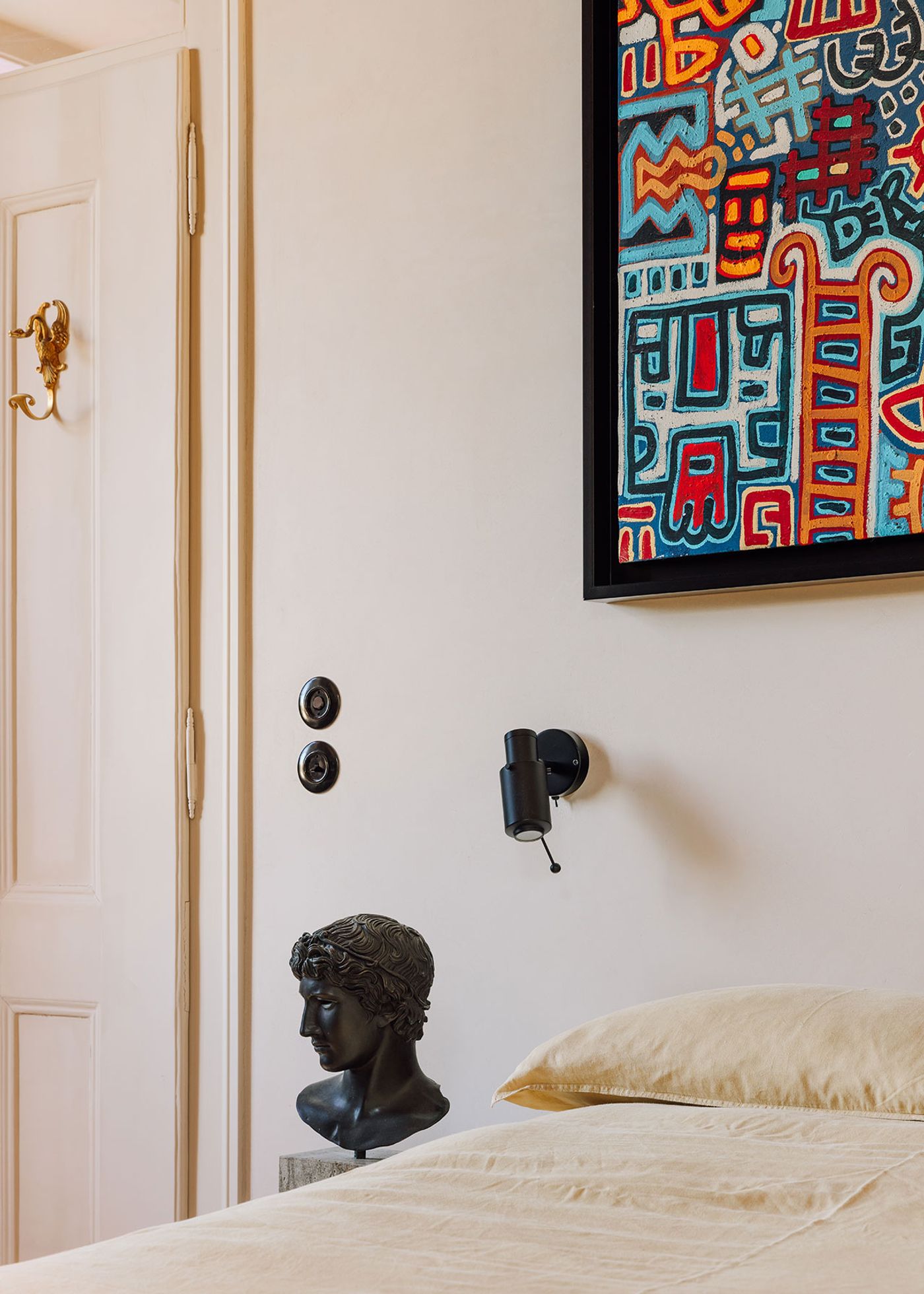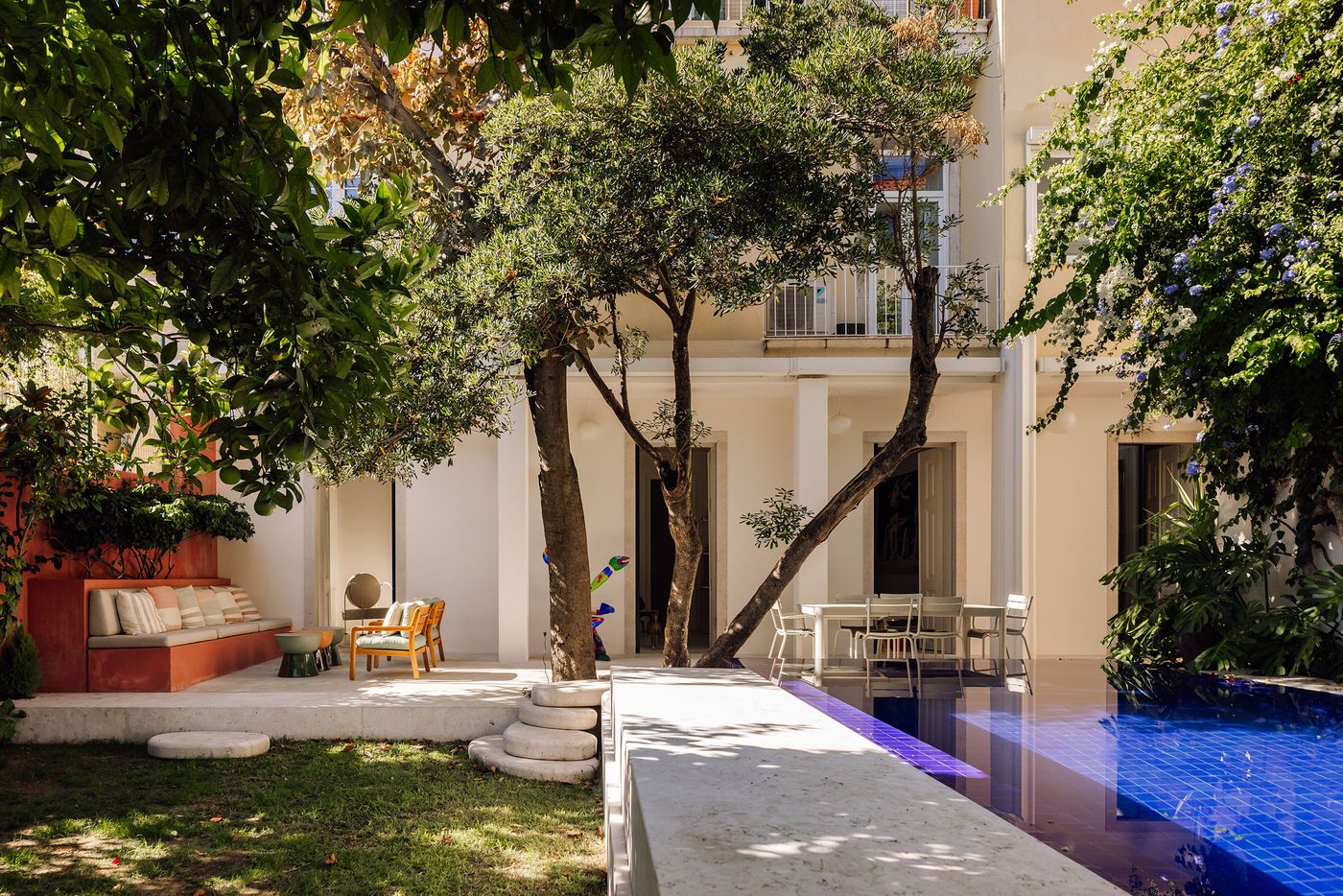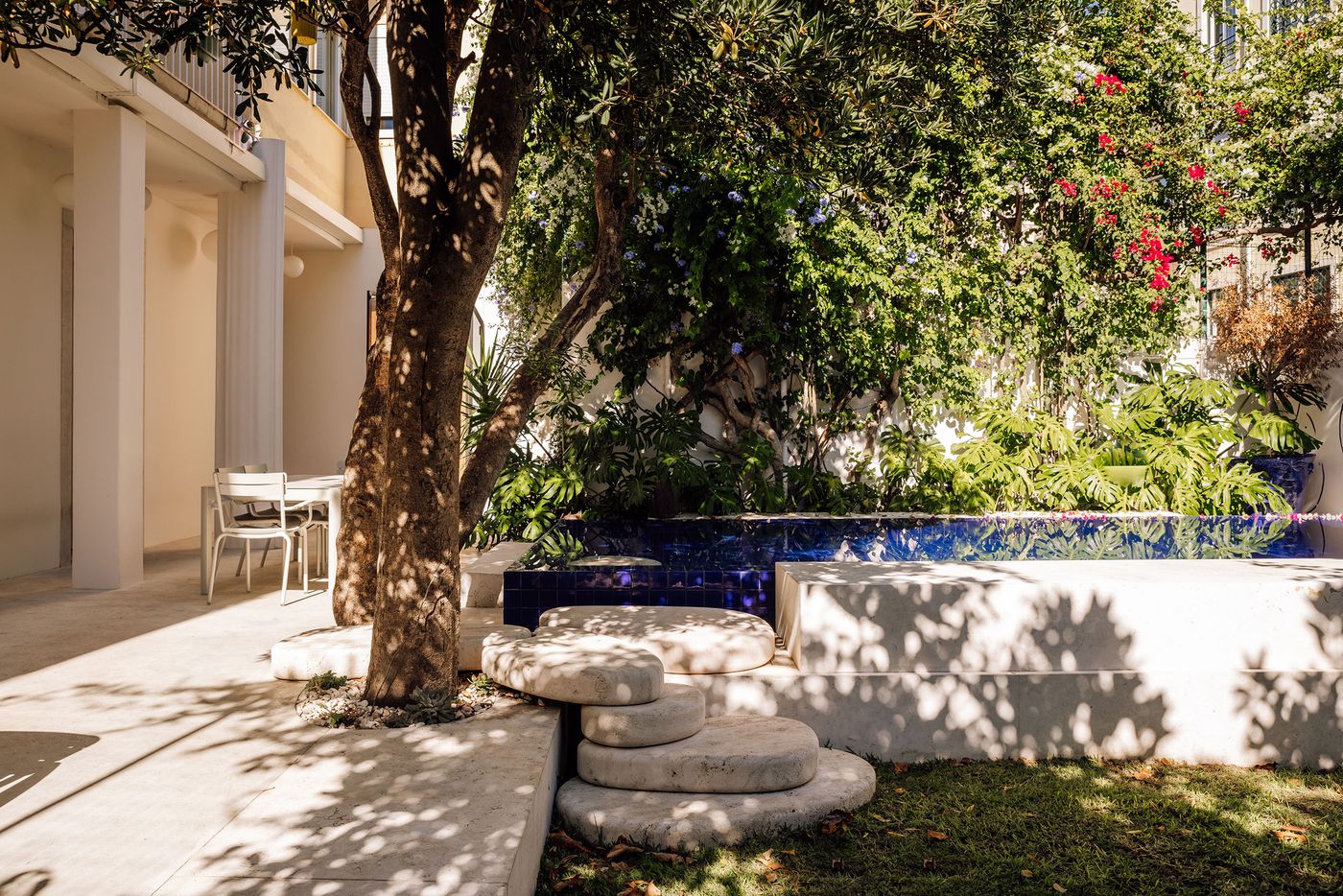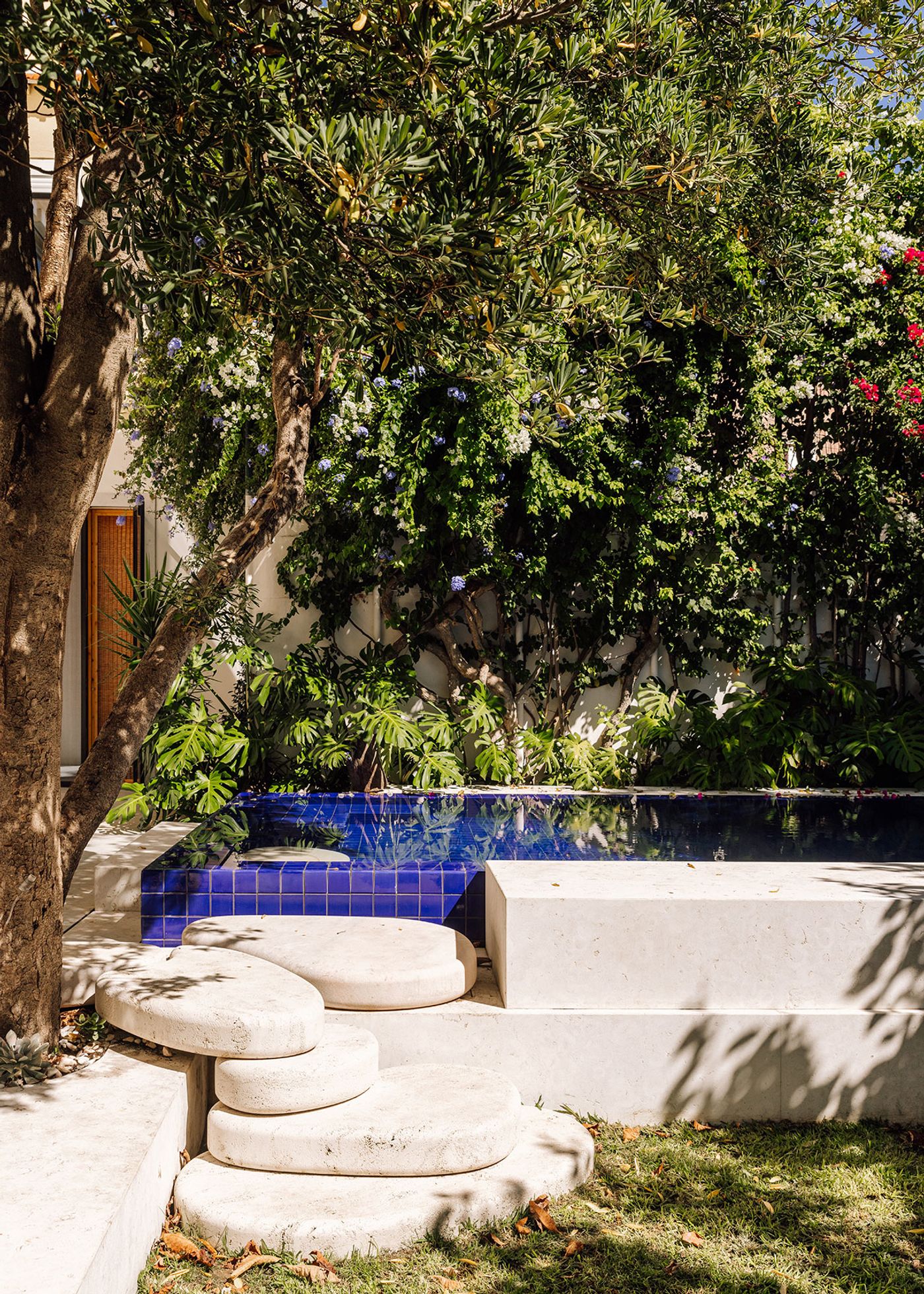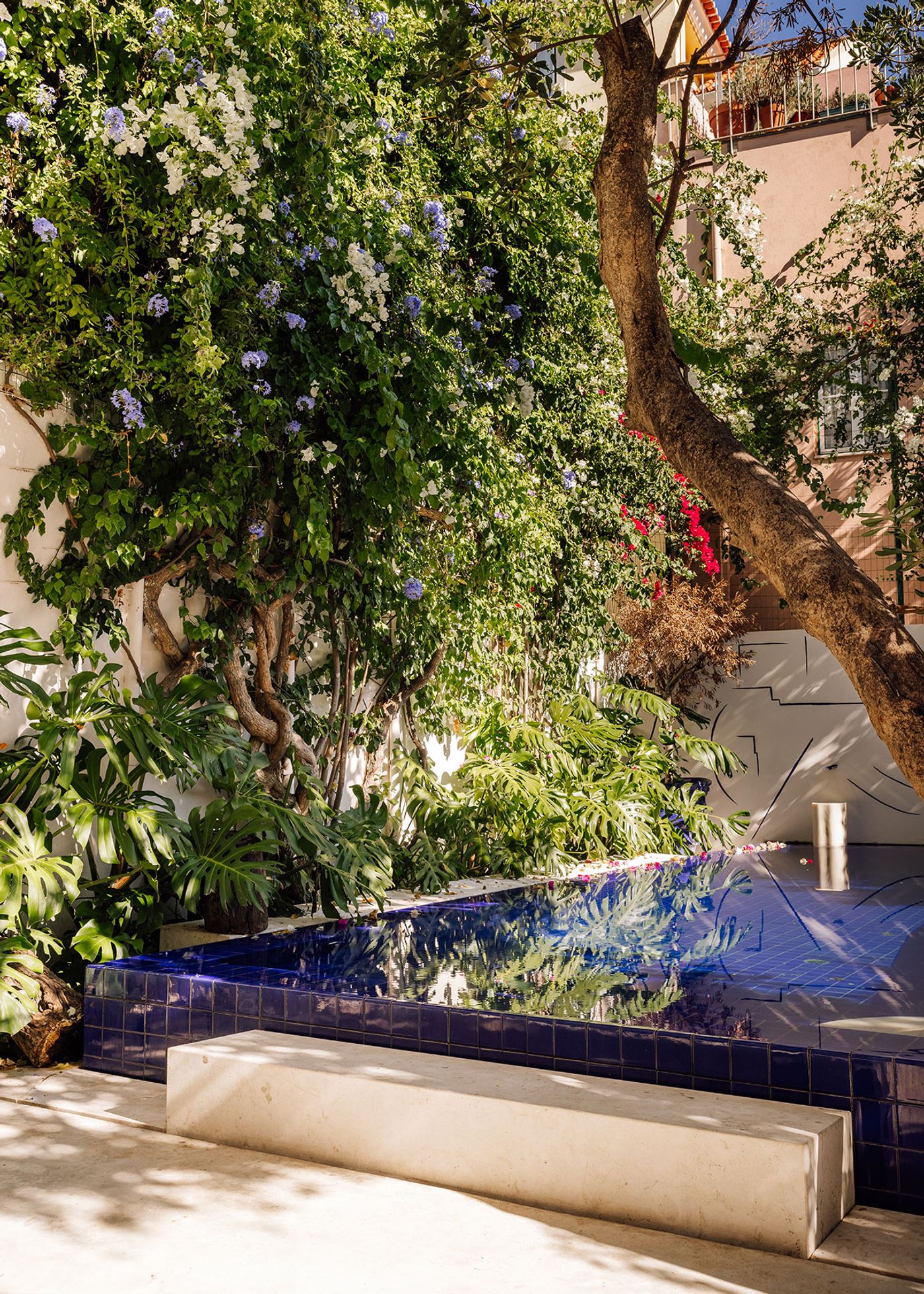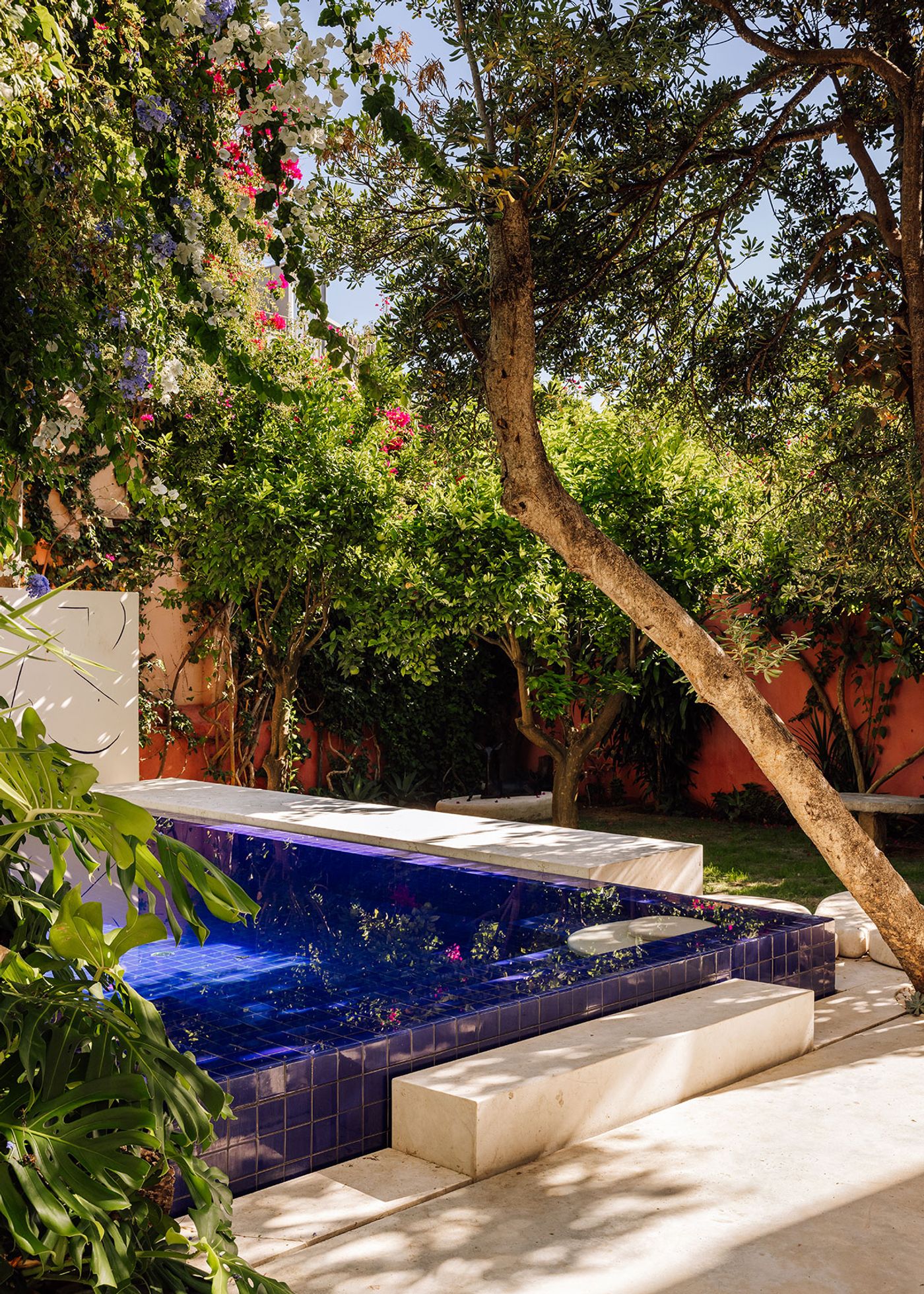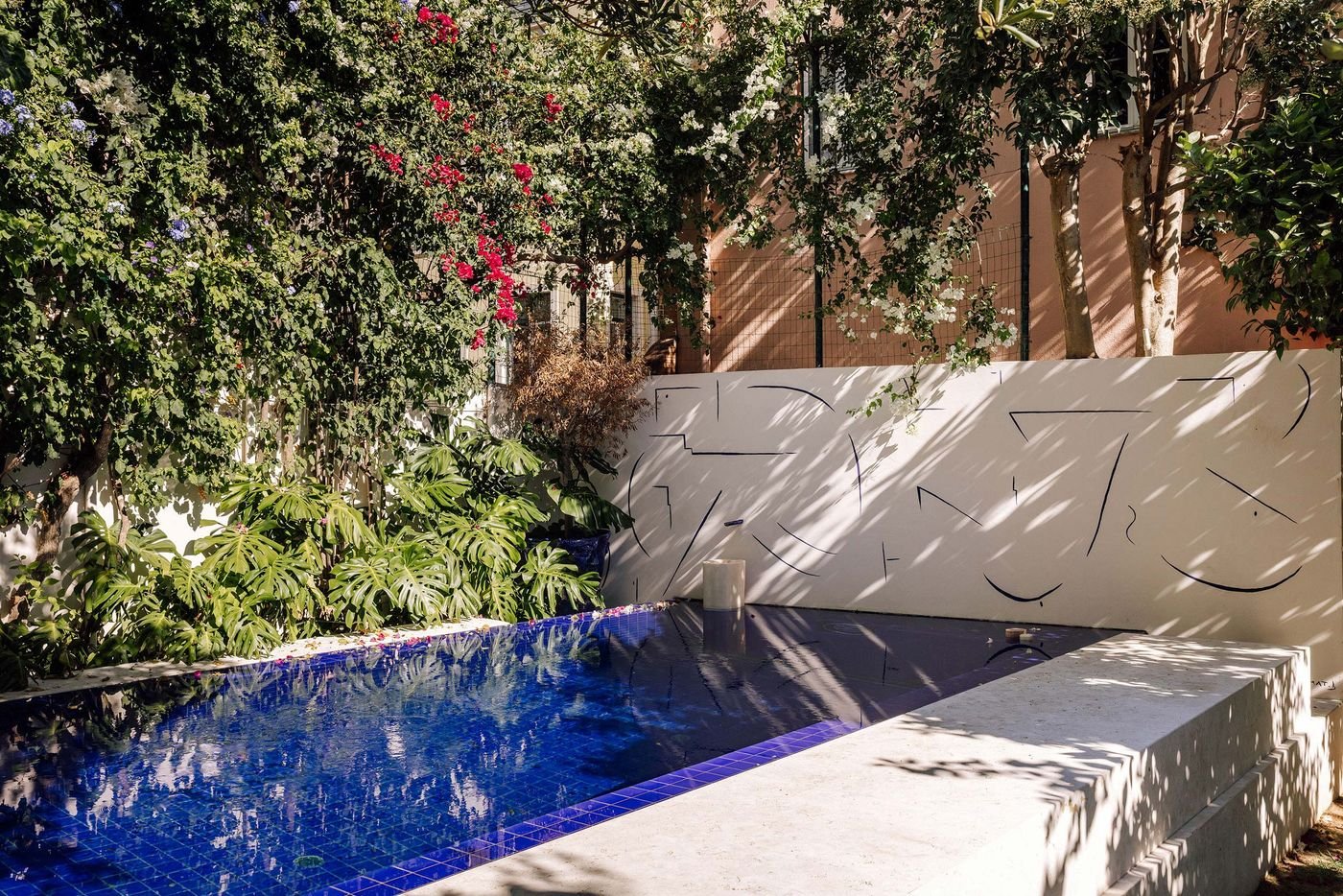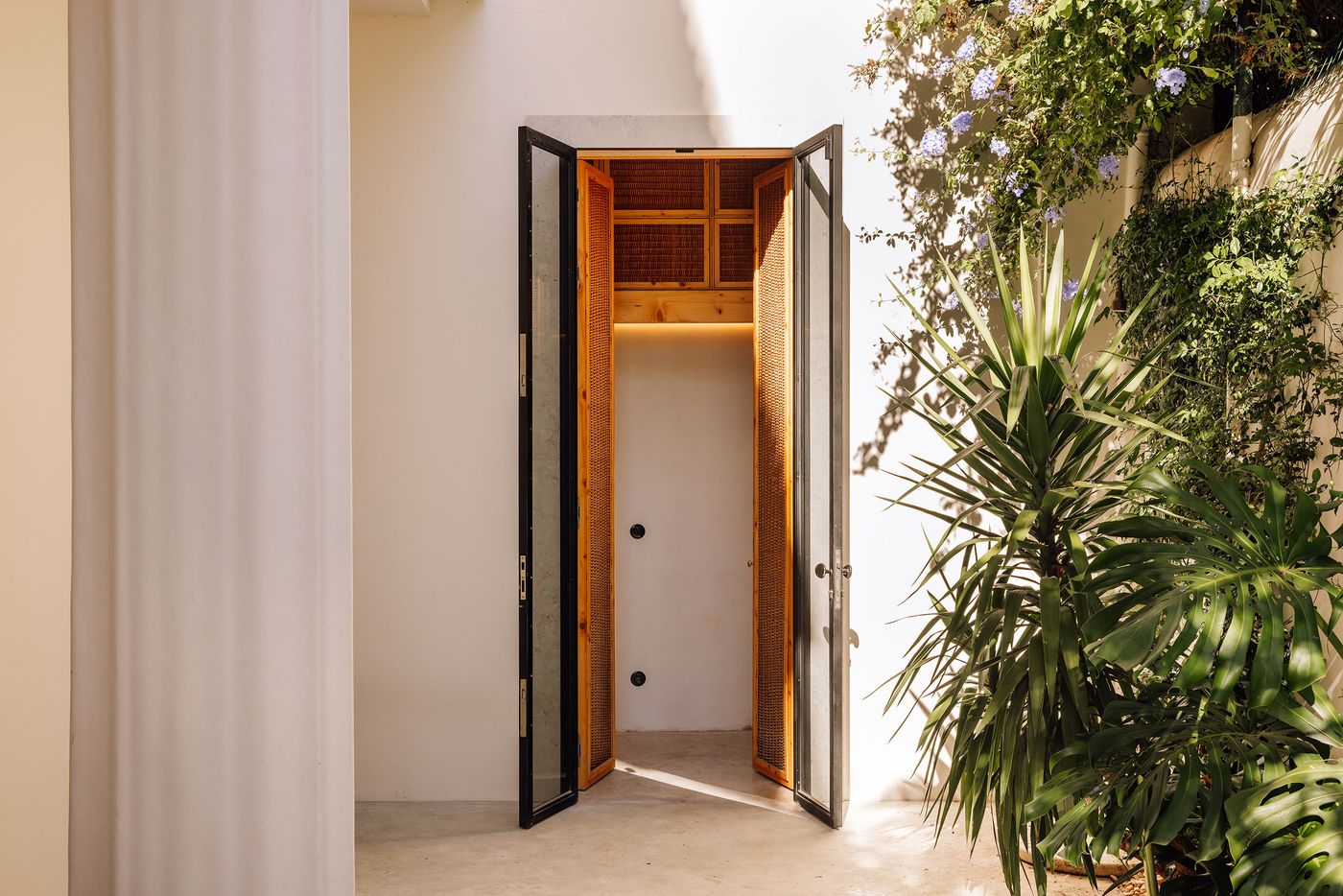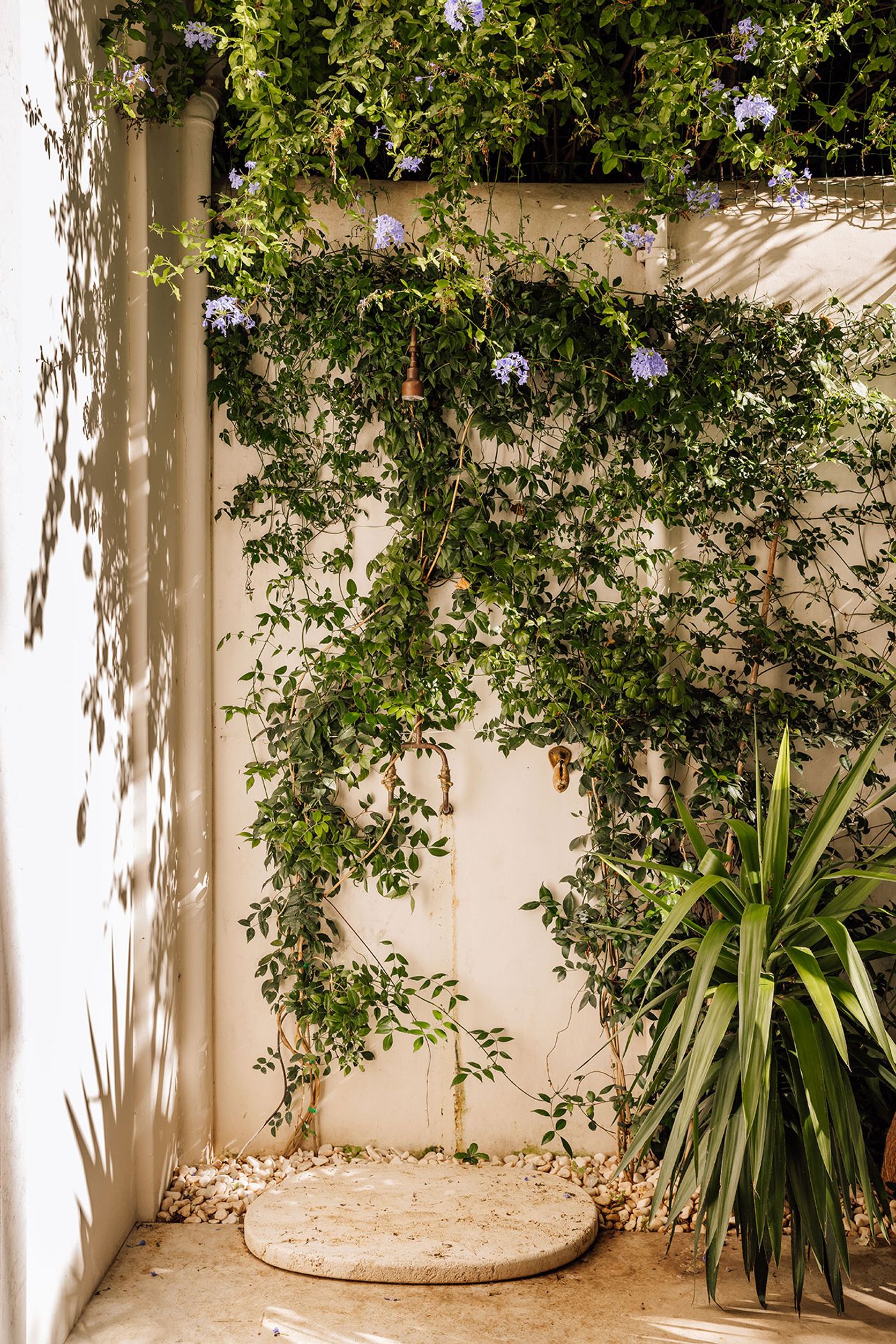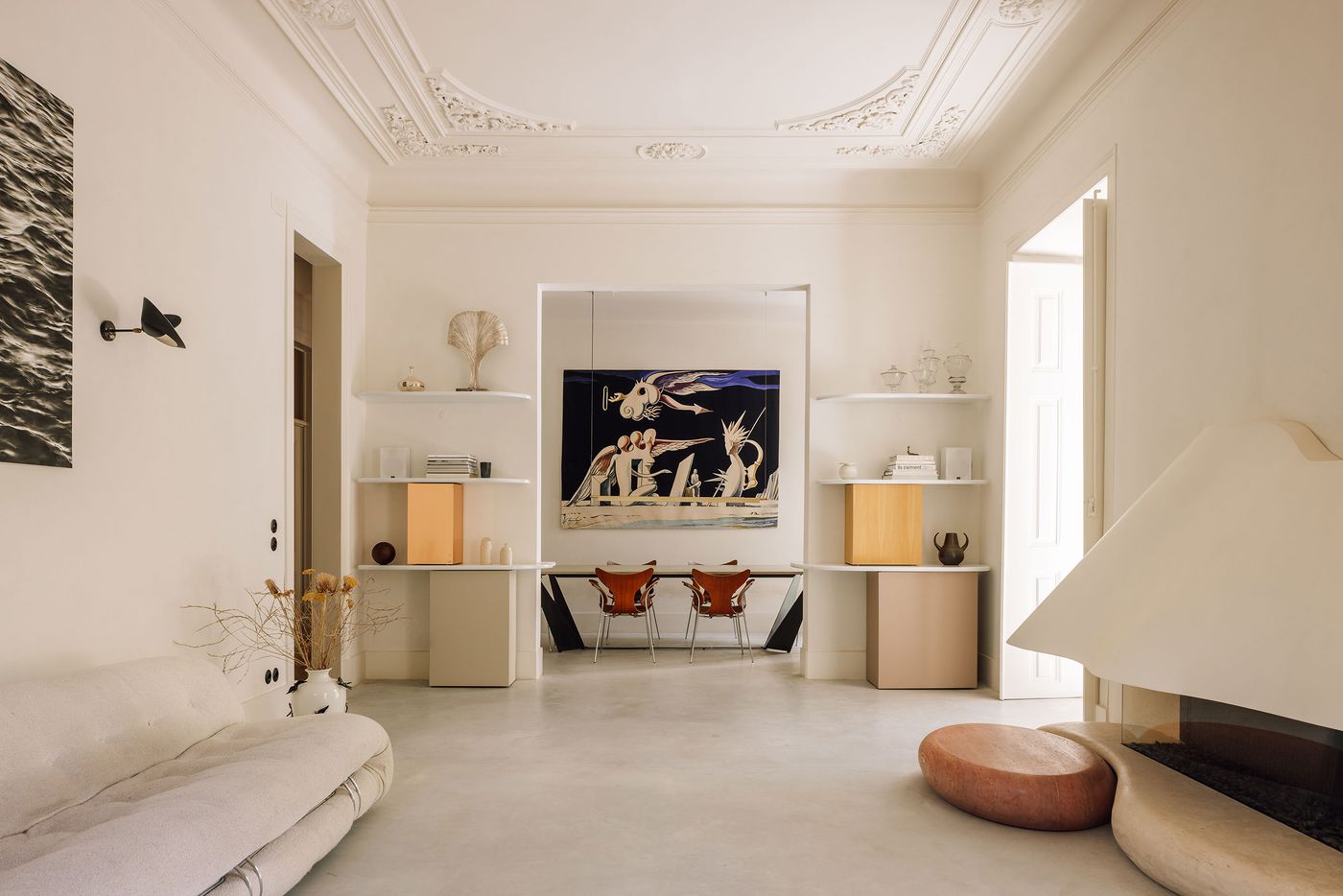
Studio Gameiro’s Contemporary Transformation of a 19th-Century Apartment in Lisbon
Words by Eric David
Location
Lisbon, Portugal
Studio Gameiro’s Contemporary Transformation of a 19th-Century Apartment in Lisbon
Words by Eric David
Lisbon, Portugal
Lisbon, Portugal
Location
Portuguese multidisciplinary design practice Studio Gameiro has a talent for harmoniously balancing contemporary design with traditional artisanship so when they were commissioned to renovate a ground floor apartment in a late 19th century building at the heart of Príncipe Real, one of Lisbon’s most coveted and beautiful neighbourhoods, they jumped at the opportunity to create a living environment that boldly yet seamlessly blends tradition with modernity. Untethered from the constraints of nostalgia with the client’s blessing, the team approached the project with originality in mind and the creative freedom to mix and match. That’s not to say that the apartment’s history is effaced or ignored; key period features have been meticulously restored while custom-made modern elements channel the property’s architectural and artisanal heritage with a twist. Add in an eclectic mix of antique and modernist furniture, a collection of classical and contemporary artworks, and a lush courtyard with a swimming pool swathed in vibrant blue tiling, and the revamped apartment exudes a sense of elevated modern living imbued with the timeless elegance of a bygone era.
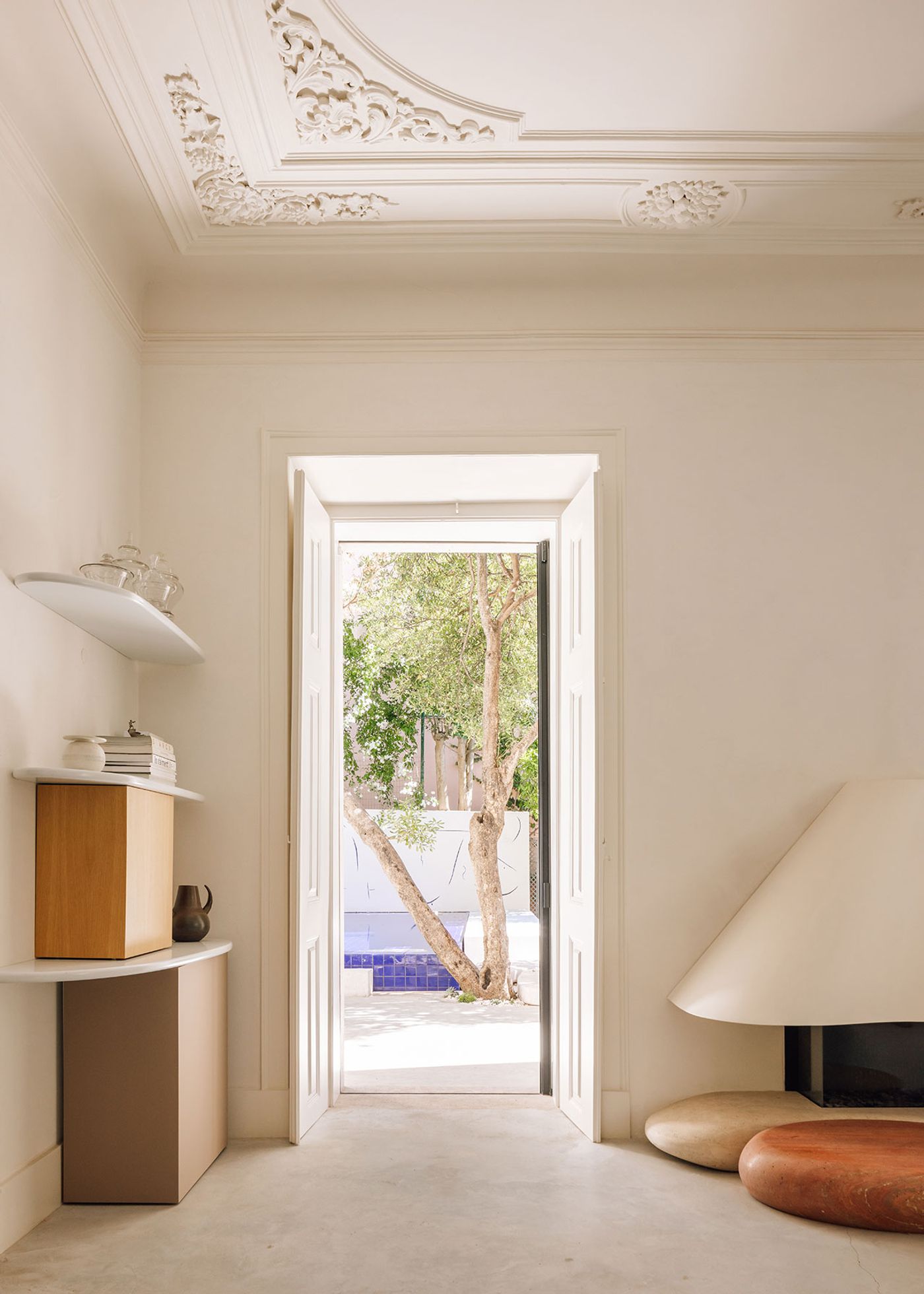
Photography by Francisco Nogueira.
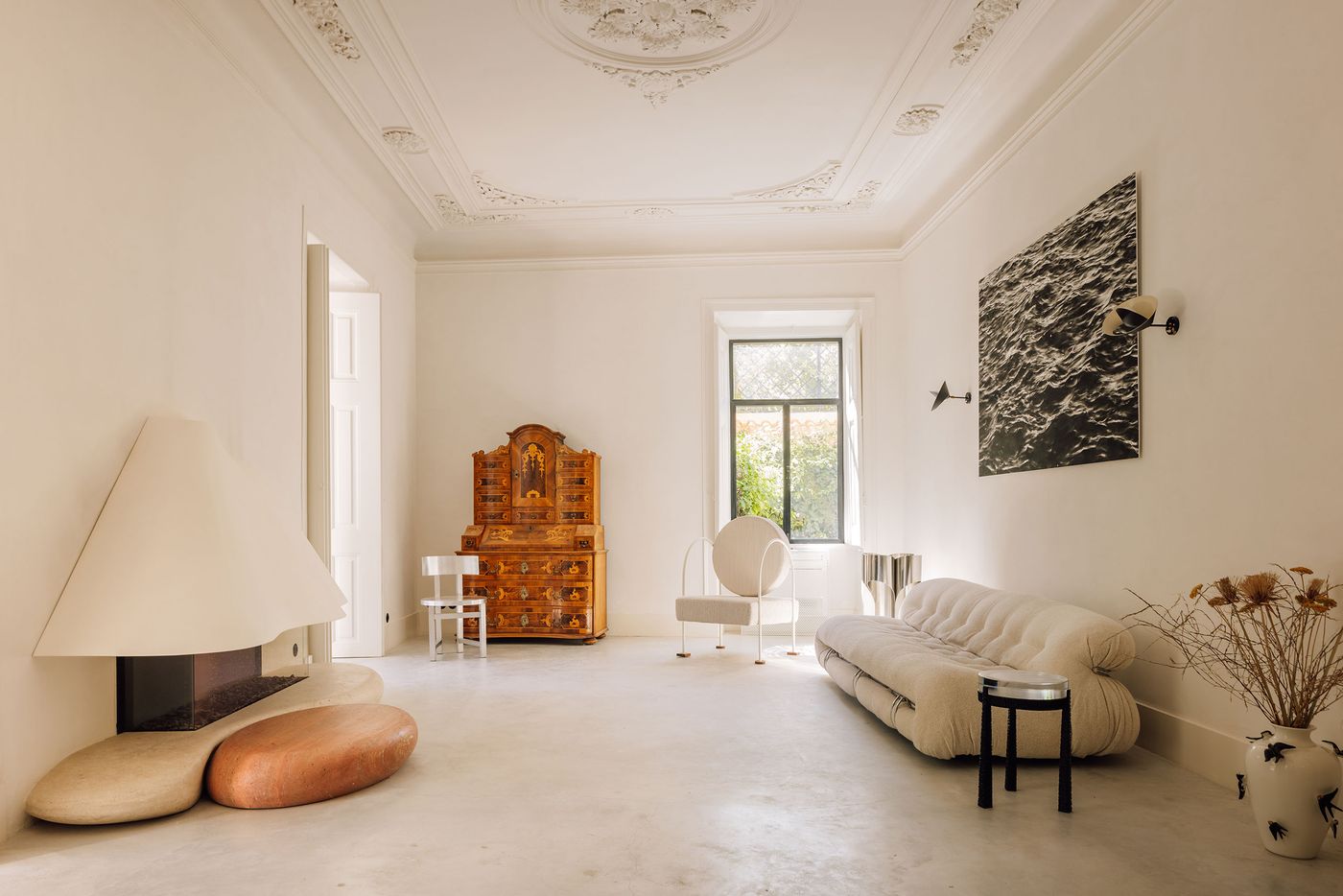
Bespoke fireplace, white and red travertine base and lacquered metal hood; 'AI203 Alumina Chair' by Studio Gameiro; Antique cabinet; ‘Capsule Armchair’ by Studio Gameiro; ‘Soriana’ sofa by Afra and Tobia Scarpa; ‘MIRRA’ Black Side Table by HAMREI; ‘Saturn Wall Sconces’ by Serge Mouille; Artwork by Teresa Esgaio.
Photography by Francisco Nogueira.
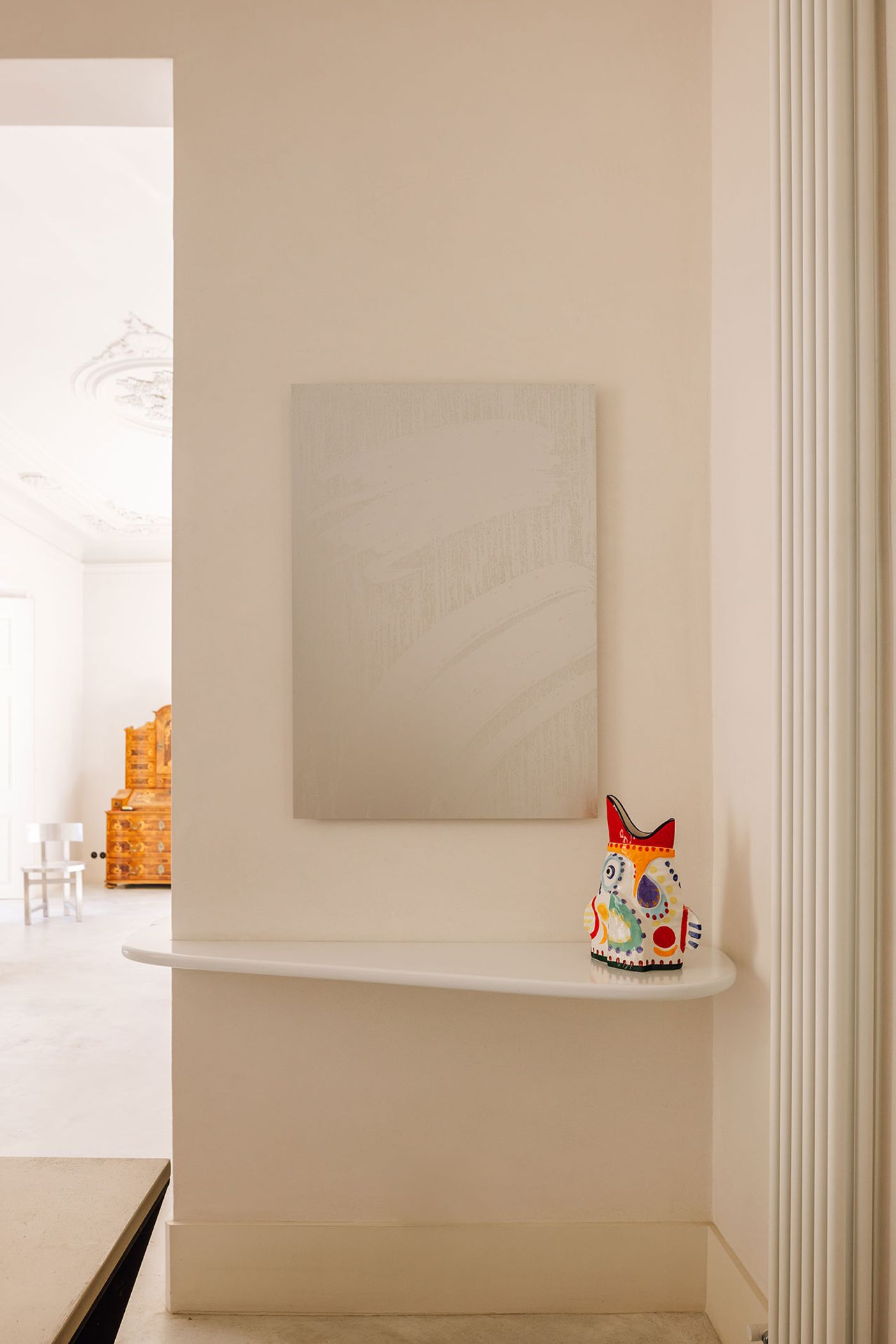
Artwork: 'Sweat panel' (2015) by Prem Sahib.Photography by Francisco Nogueira.
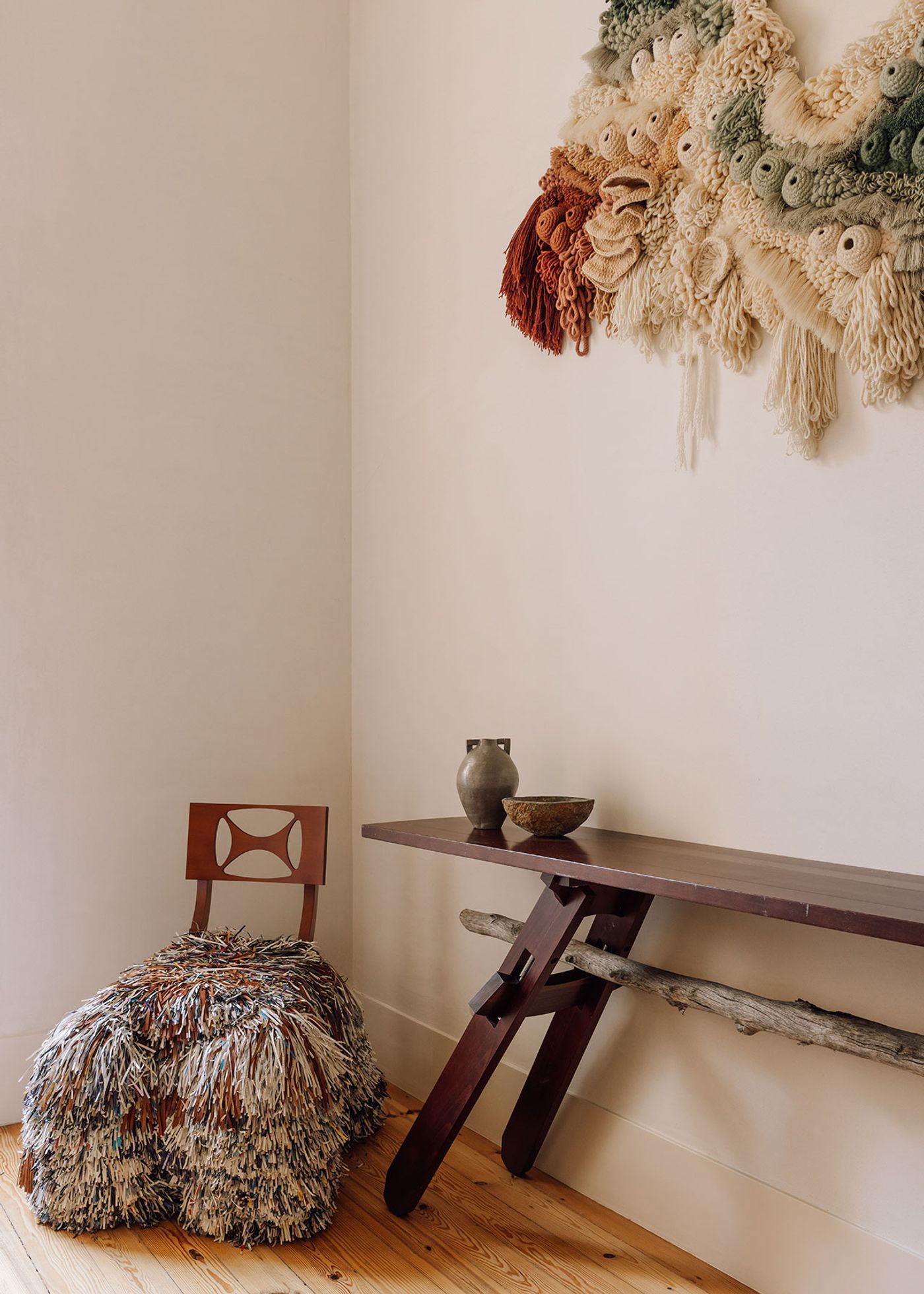
Chair by petit h for Hermès; Tapestry by Vanessa Barragão; ‘Boboolo' console by Philippe Starck.Photography by Francisco Nogueira.
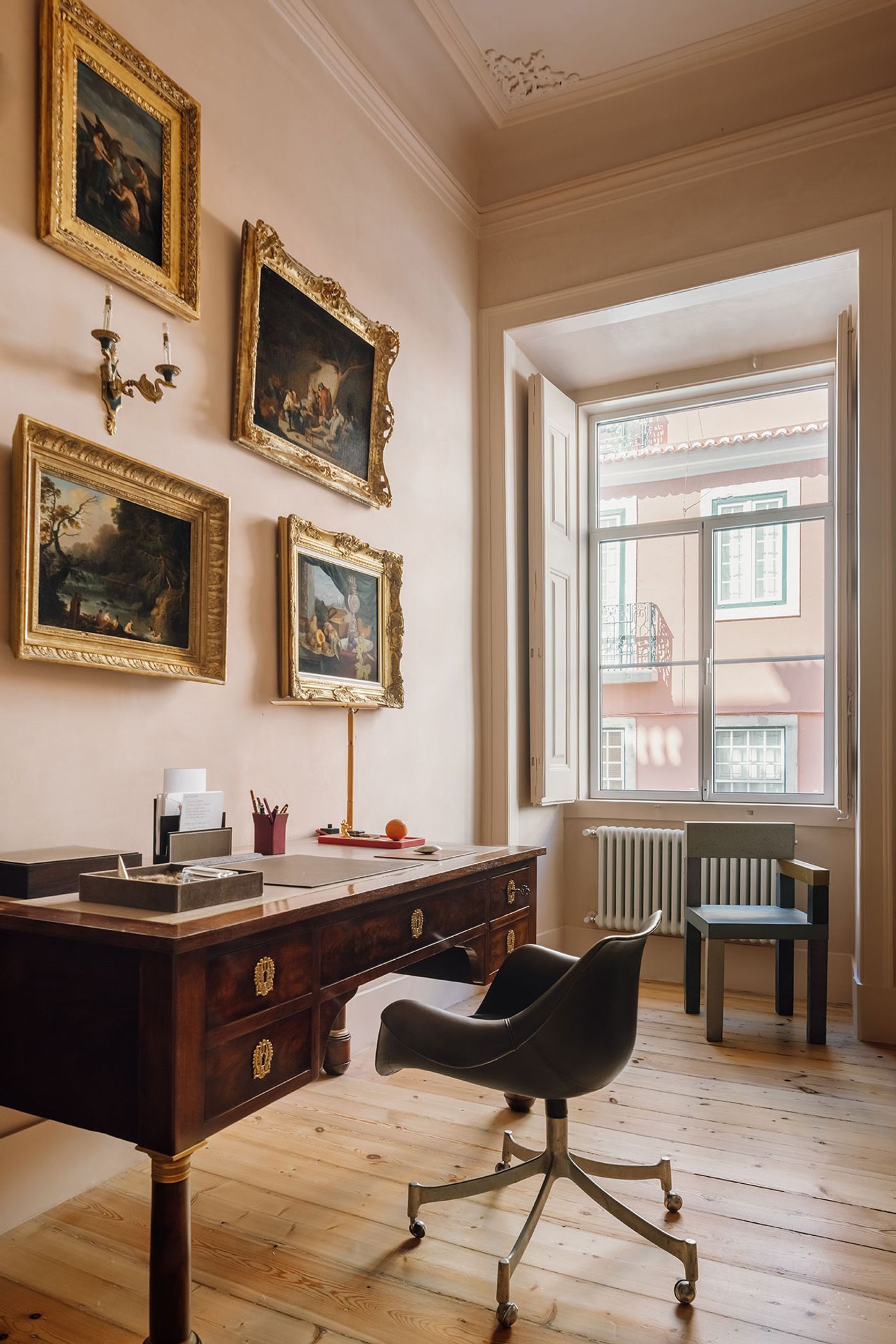
Photography by Francisco Nogueira.
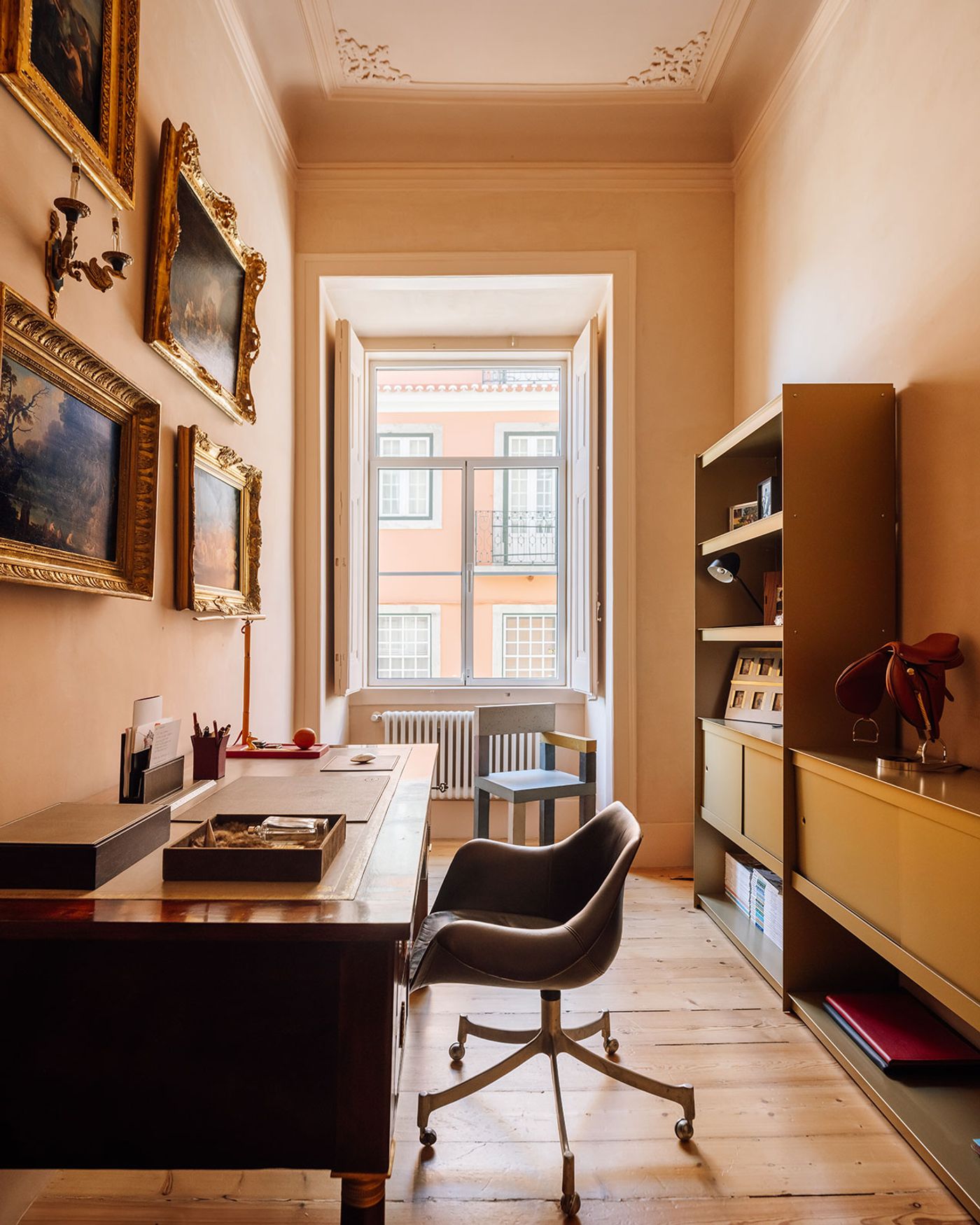
Photography by Francisco Nogueira.

Photography by Francisco Nogueira.
At the heart of the renovation was a desire to transform the apartment into a home that feels immediately welcoming, capturing both the property's original character and the dynamic, contemporary spirit of its vibrant neighbourhood. The design team meticulously restored key period features, such as the ornate ceiling moldings, while seamlessly infusing a cosmopolitan flair throughout the interior.
The renovation involved a complex process of transformation, stripping away layers of cement patches, previous renovations, and botched repairs. In their place, a robust, eco-friendly foundation was established using lime-based plaster, a material that pays homage to traditional craftsmanship. This choice allowed the walls to breathe, yielding a velvety matte finish that not only repels fungi but also purifies the air by capturing pollutants. Complemented by concrete flooring in some rooms and refurbished hardwood in others, the plastered walls bring a soothing ambiance to the spaces, while bespoke furnishings made from wood, granite, and marble add rich textures.
Custom-made elements were integral to the renovation, each crafted in collaboration with skilled local artisans who used natural materials in a sustainable manner. From the hand-carved wooden headboard in the master bedroom and the marble washbasin in the principal bathroom, to the handmade solid brass door handles and the wave-shaped granite backsplash in the kitchen—described by the designers as "a projection of the client’s voice soundwaves, or chitchat over great food"—every detail was thoughtfully designed to feel as though it had always belonged to the space.
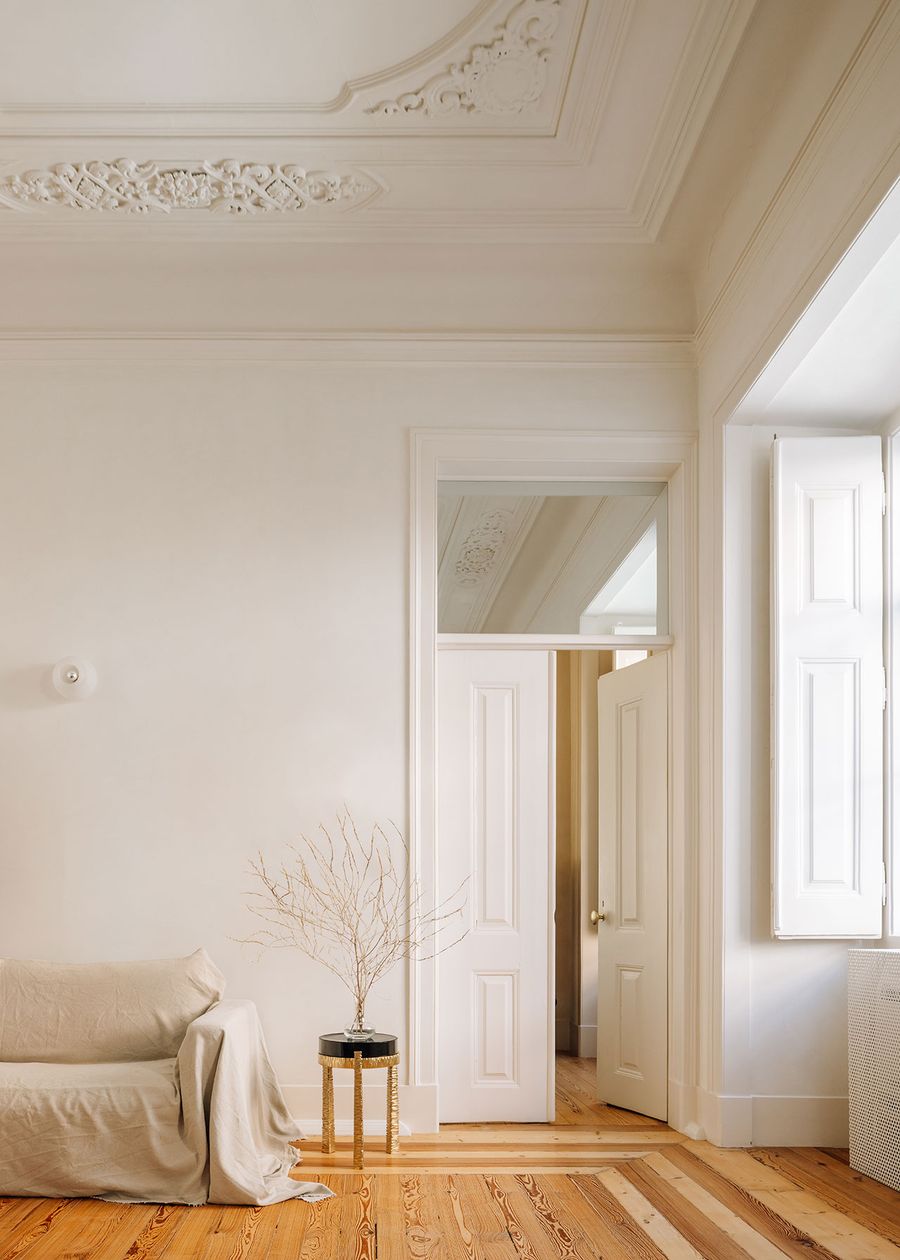
Photography by Francisco Nogueira.
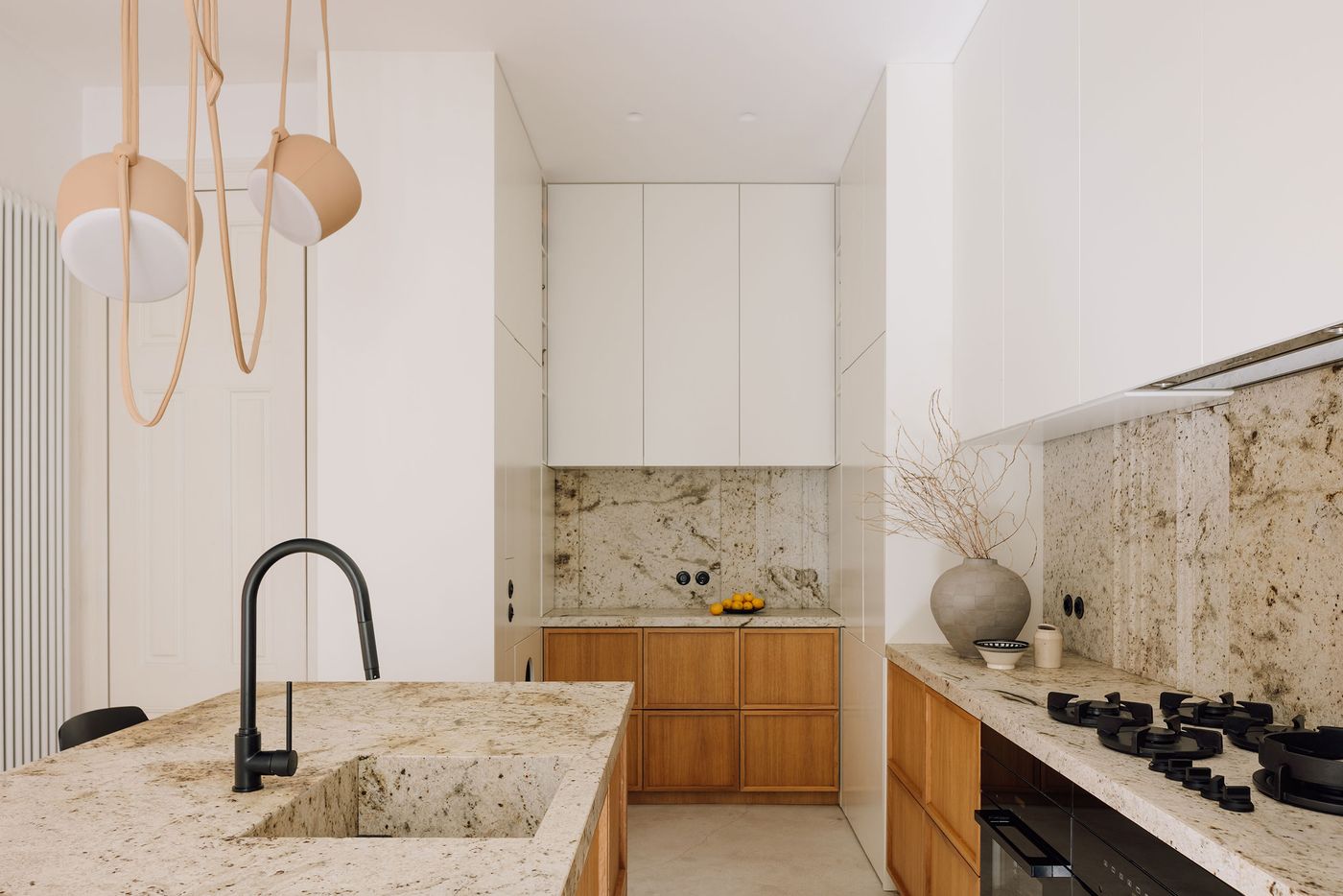
Photography by Francisco Nogueira.
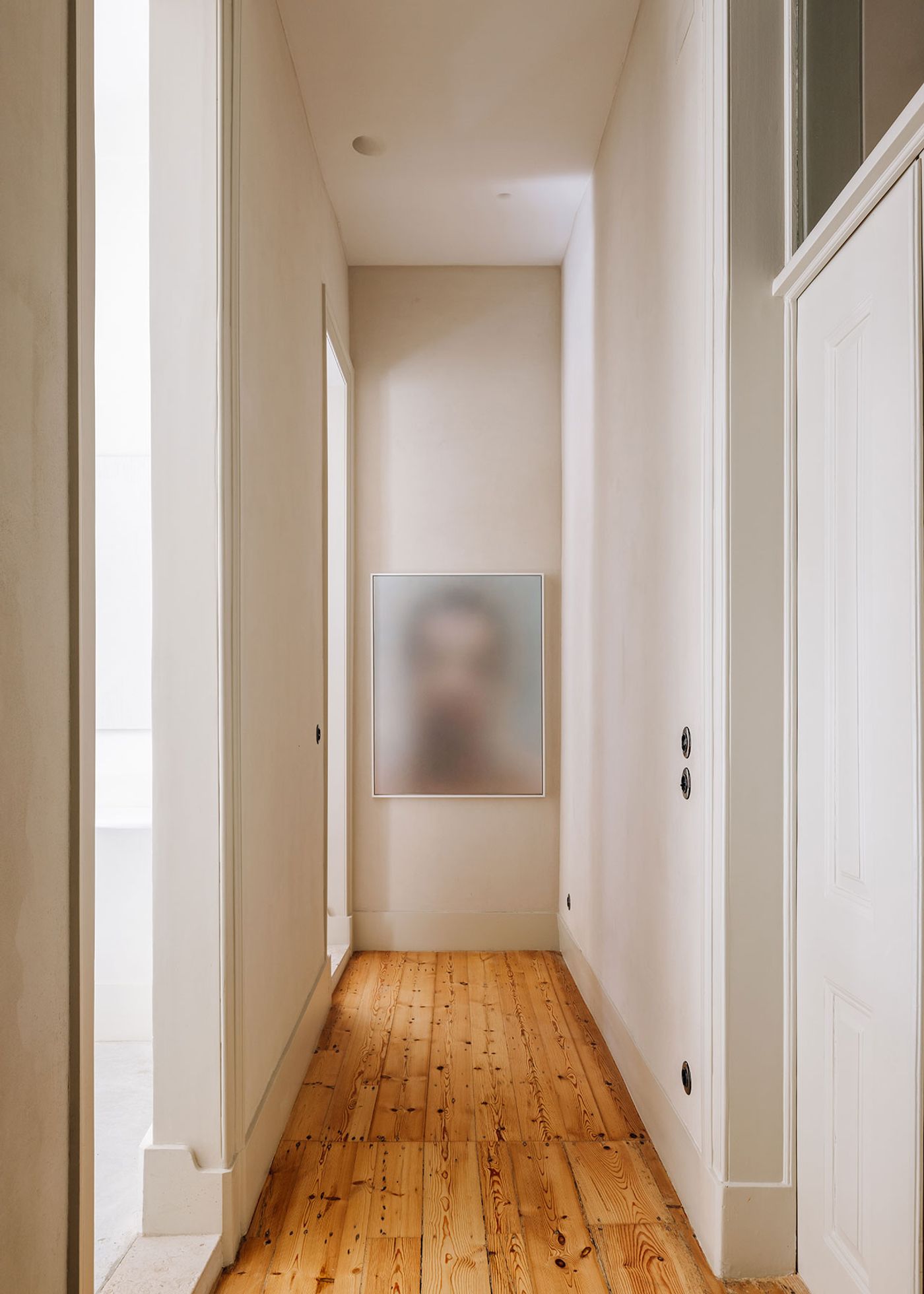
Artwork: Ghost 13 (2013) by Miaz Brothers.Photography by Francisco Nogueira.
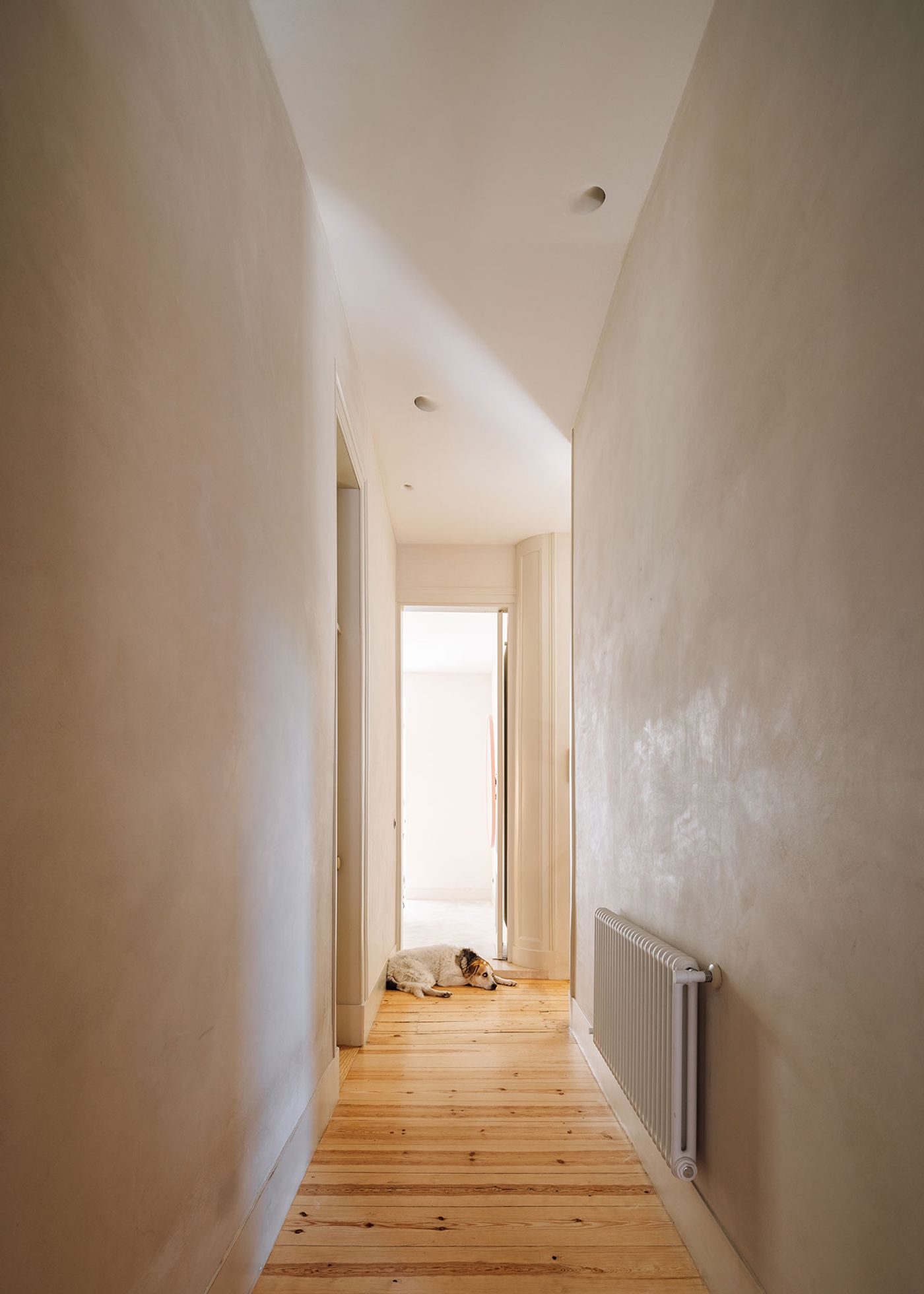
Photography by Francisco Nogueira.
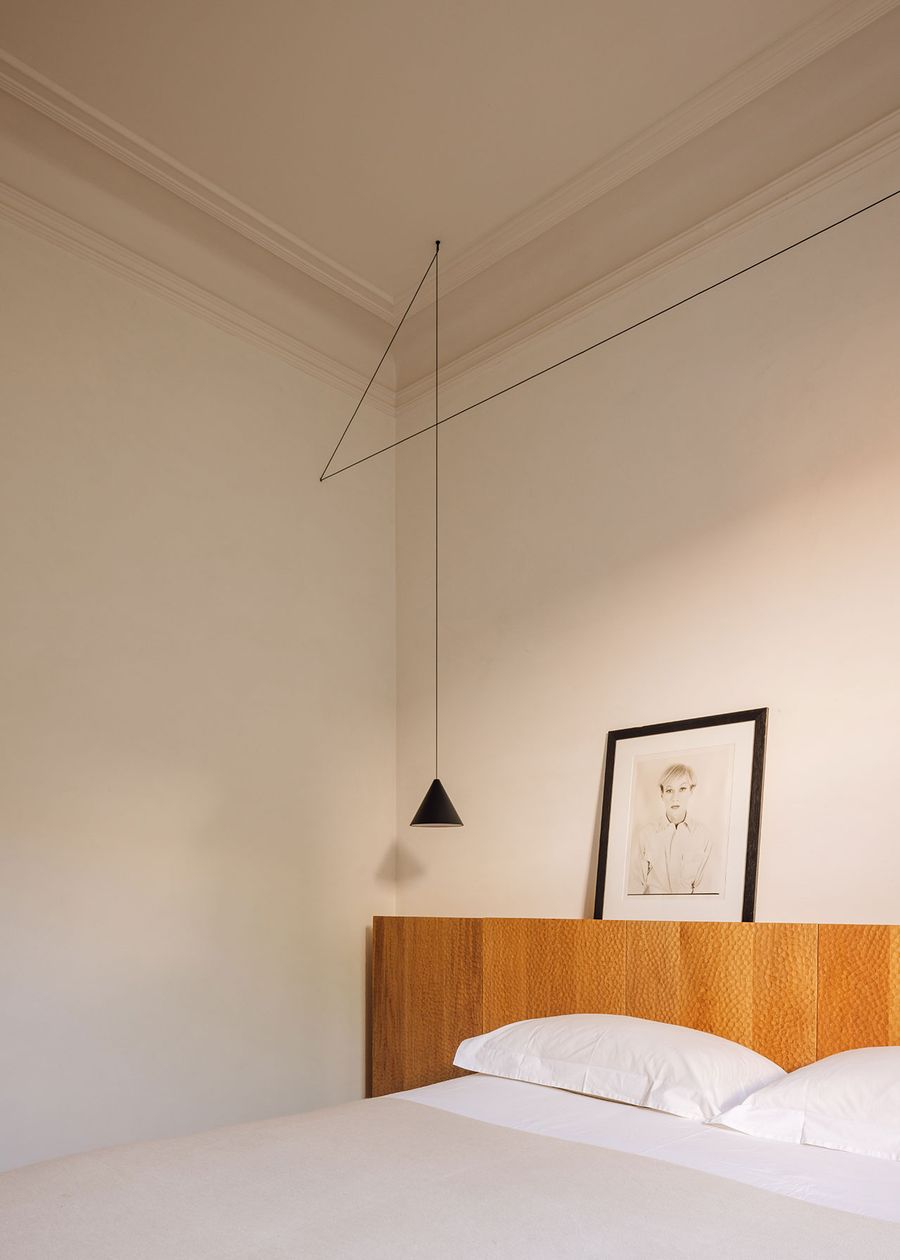
Photography by Francisco Nogueira.
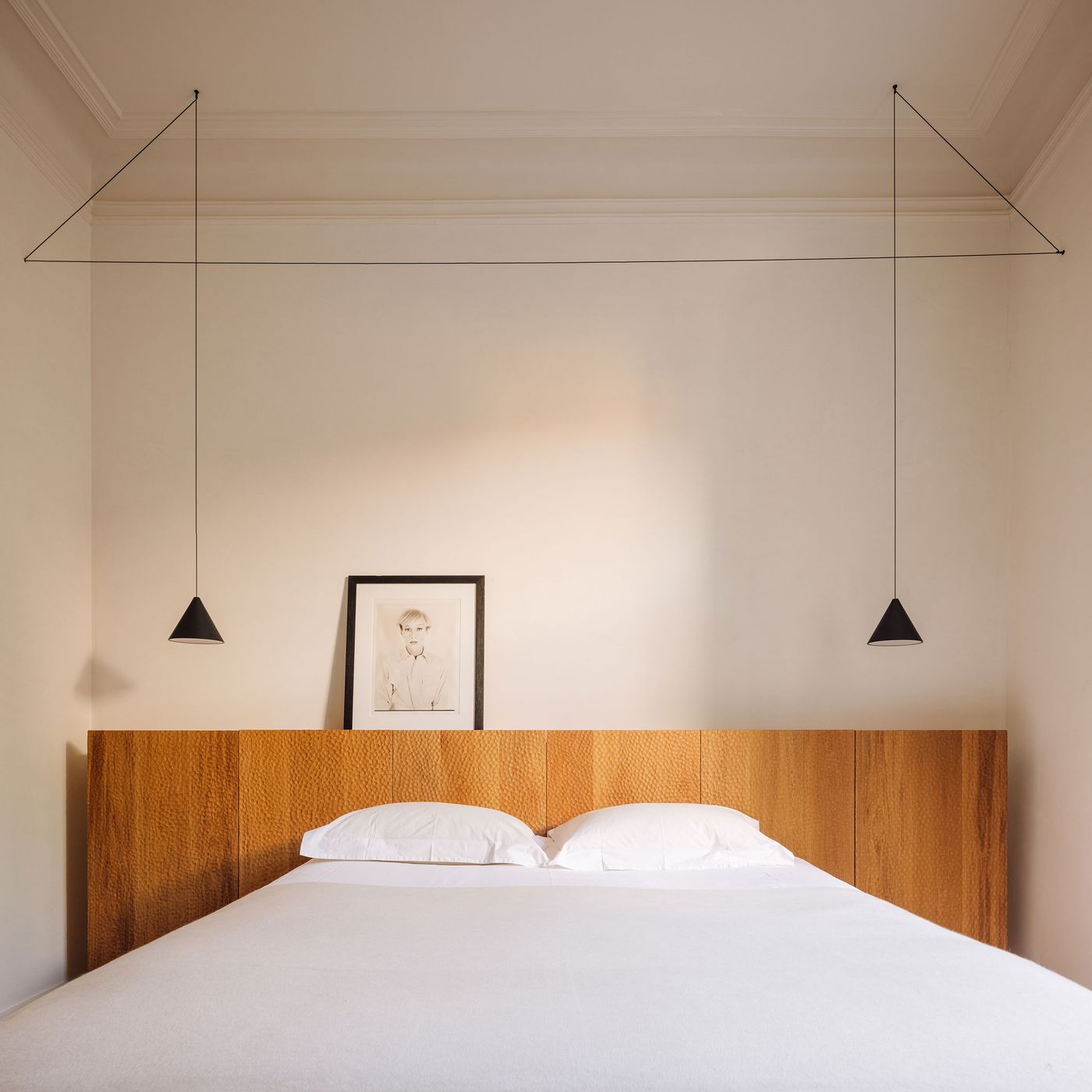
Photography by Francisco Nogueira.
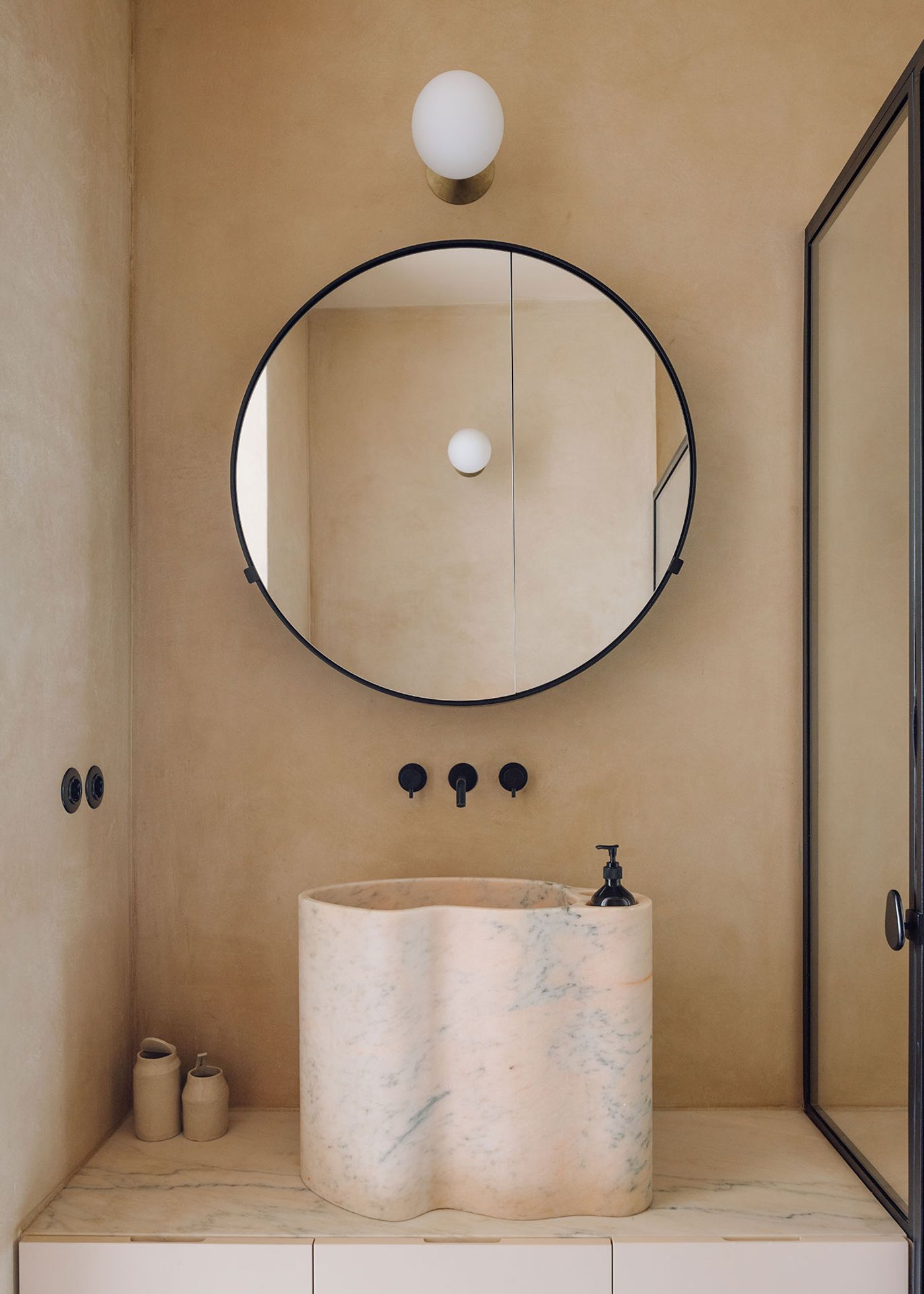
Photography by Francisco Nogueira.
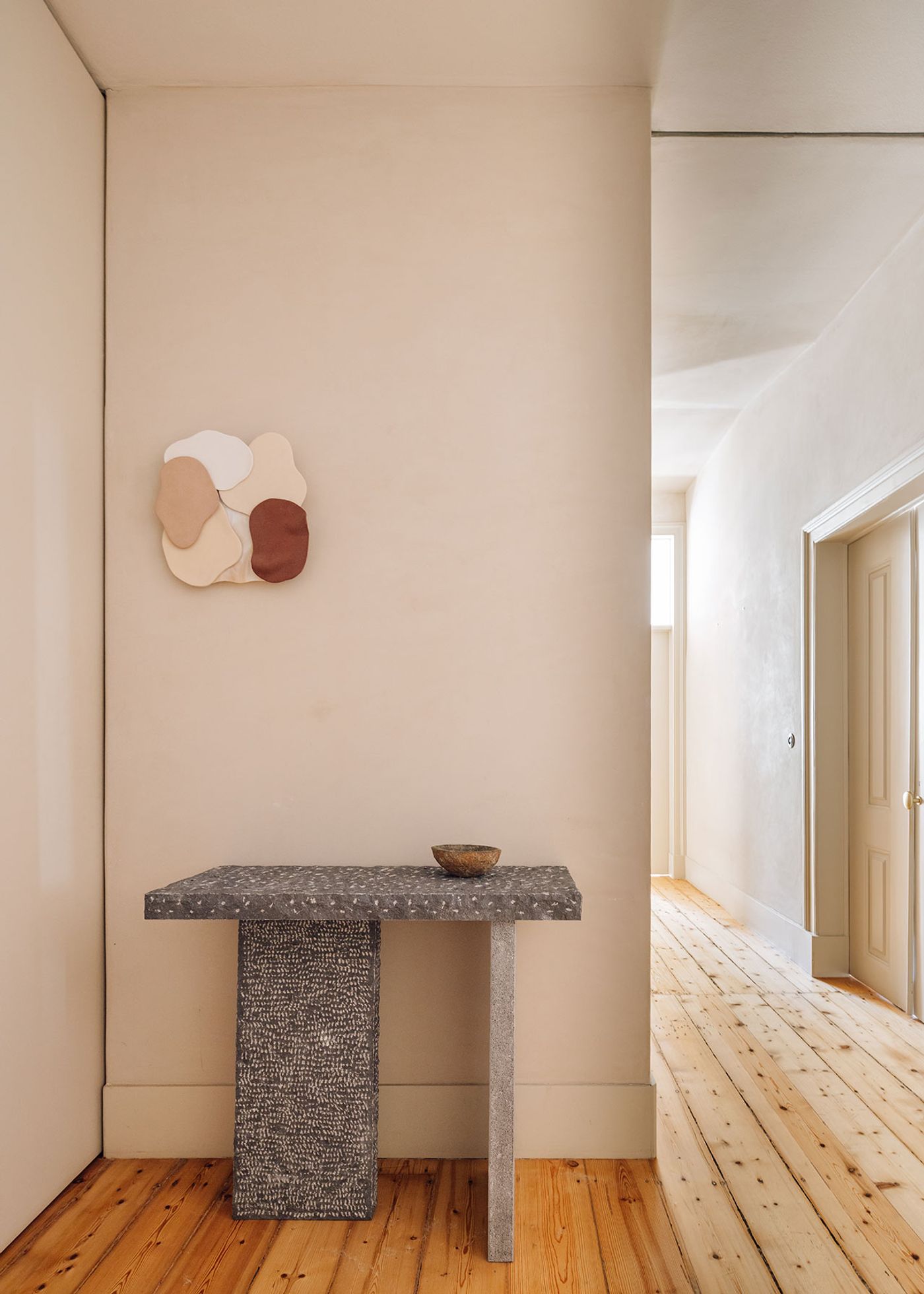
The Dolmen console by Studio Gameiro.
Photography by Francisco Nogueira.
The muted colour palette throughout serves as a subtle backdrop for an eclectic mix of furniture, including antiques, iconic modernist pieces such as the Soriana Sofa by Afra and Tobia Scarpa (1969) and the Saturn Wall Sconces by Serge Mouille (1957), as well as original designs from Studio Gameiro’s own collections; highlights include the Capsule Armchair and Alumina Chair, both of which combine simple geometric forms with a light, space-age sensibility. The team also designed a unique console specifically for the project constructed from three slabs of hammered Lecarrow Limestone, in a piece that departs from the streamlined elegance of the studio’s earlier work, embracing a raw, tactile quality.
Another key aspect of the studio's design philosophy was introducing an organic design language, characterized by free-flowing forms and natural materials. "The relationship with the exterior was always central to the interior design, so it felt natural to bring those organic shapes inside," the team explains. One of the most striking examples of this approach is the living room fireplace, which features a wavy lacquered metal hood and a base made of white and red travertine whose organic forms echo the bespoke natural stone steps and benches in the garden. "The intention was to create a shape that emerges from the wall, resembling the ornamental details found throughout the house," the studio notes.
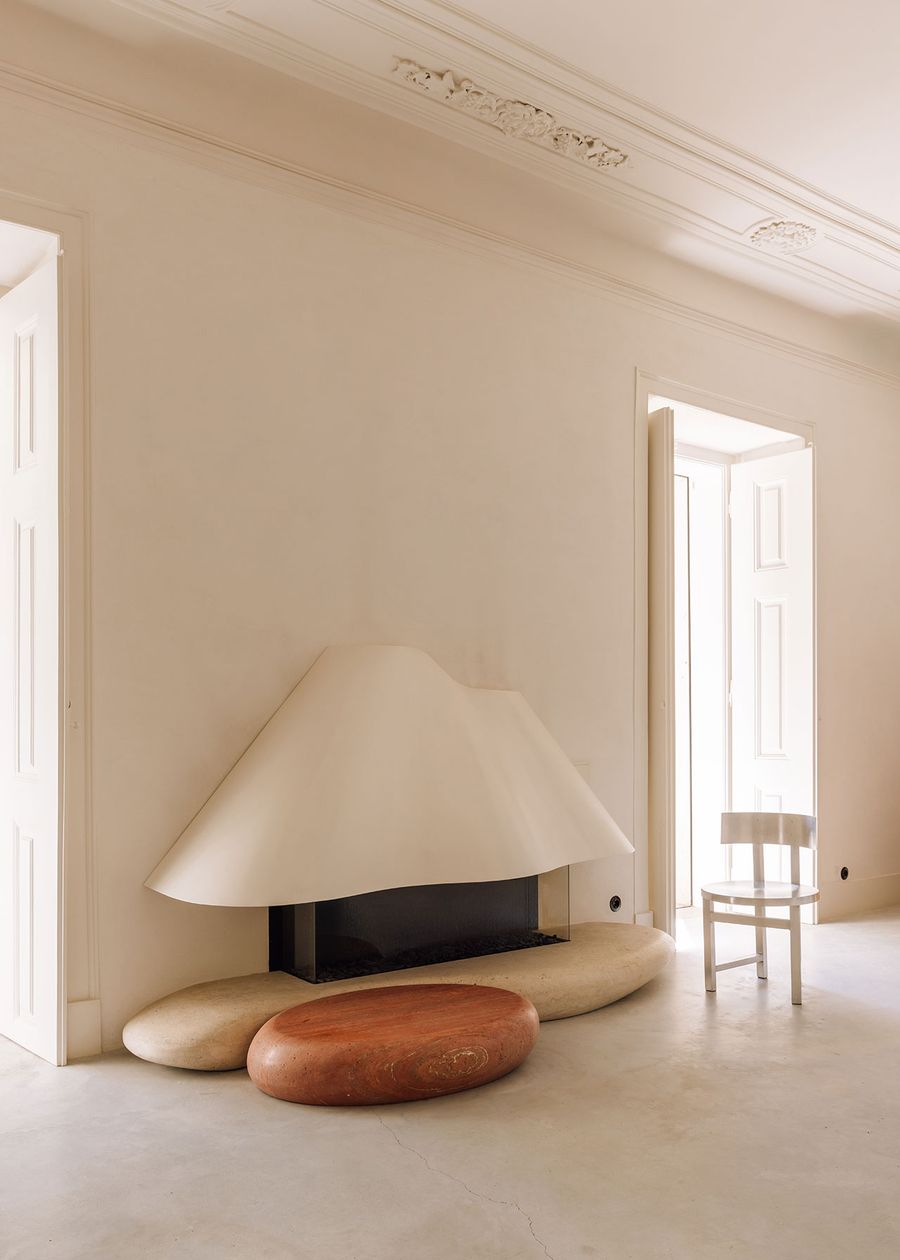
Bespoke fireplace, white and red travertine base and lacquered metal hood; 'AI203 Alumina Chair' by Studio Gameiro.
Photography by Francisco Nogueira.
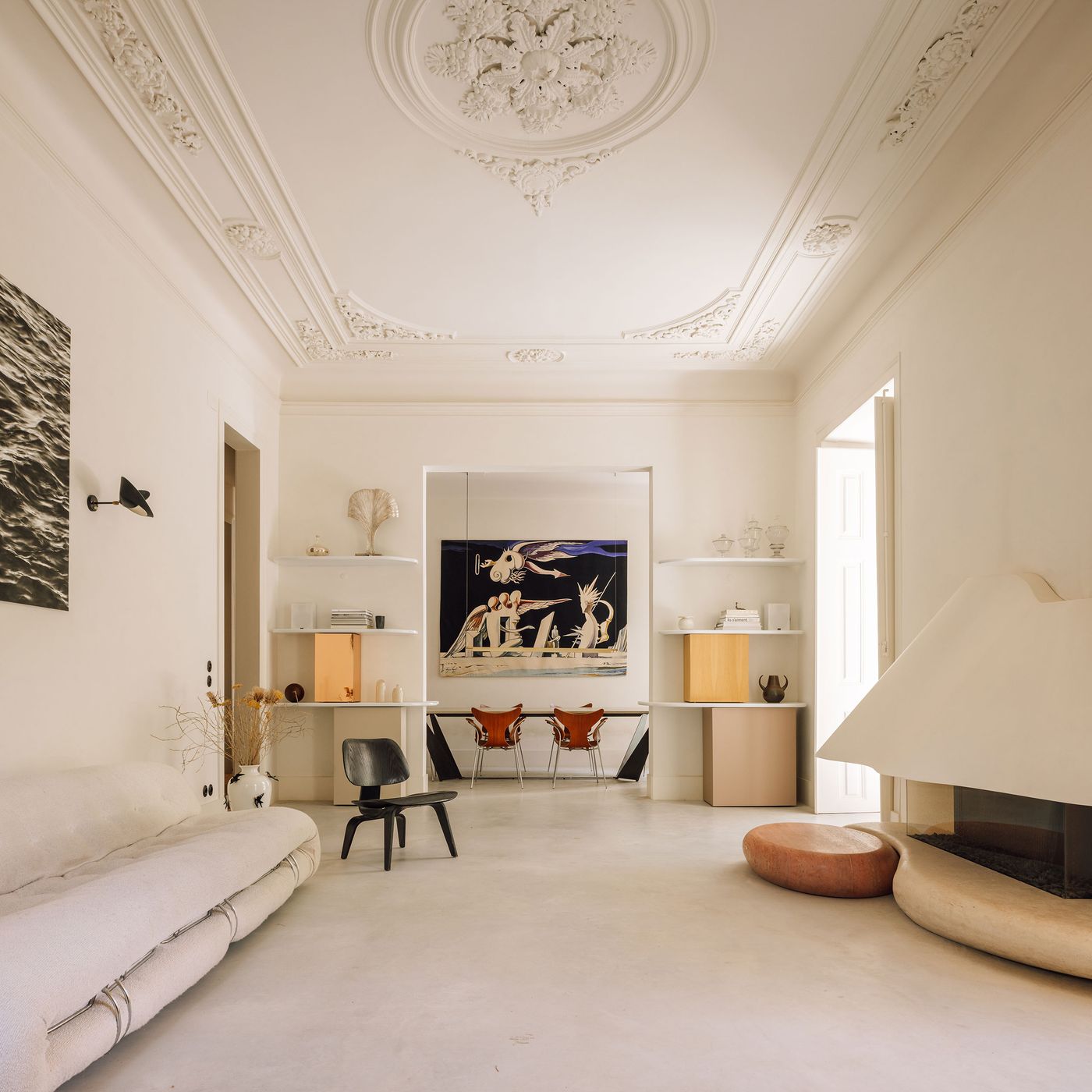
Tapestry by Cruzeiro Seixas; 'Lily' dining chairs by Arne Jacobsen; Lounge Chair Wood (LCW) by Charles and Ray Eames; ‘Soriana’ sofa by Afra and Tobia Scarpa; ‘Saturn Wall Sconces’ by Serge Mouille; Artwork by Teresa Esgaio.Photography by Francisco Nogueira.
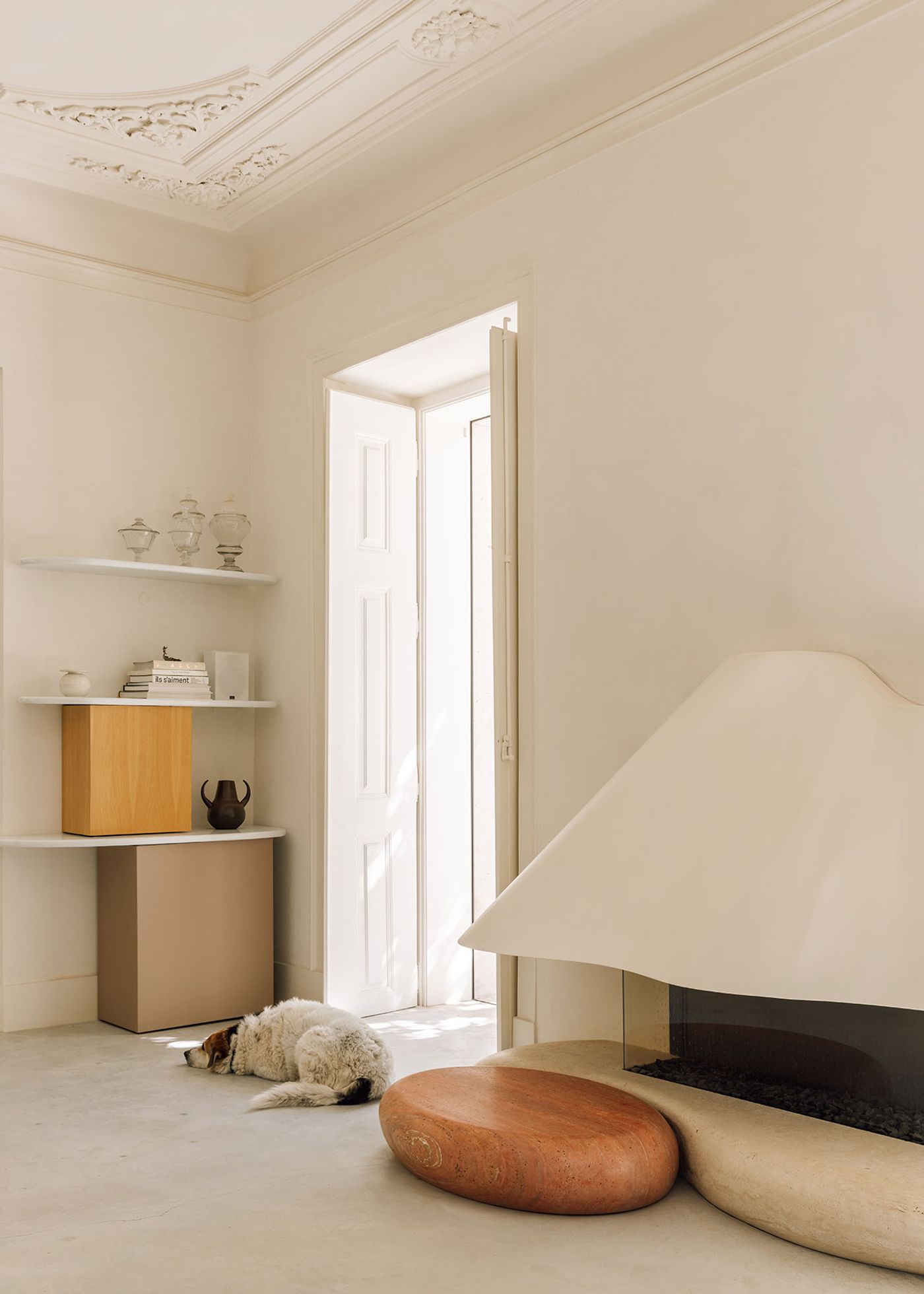
Photography by Francisco Nogueira.
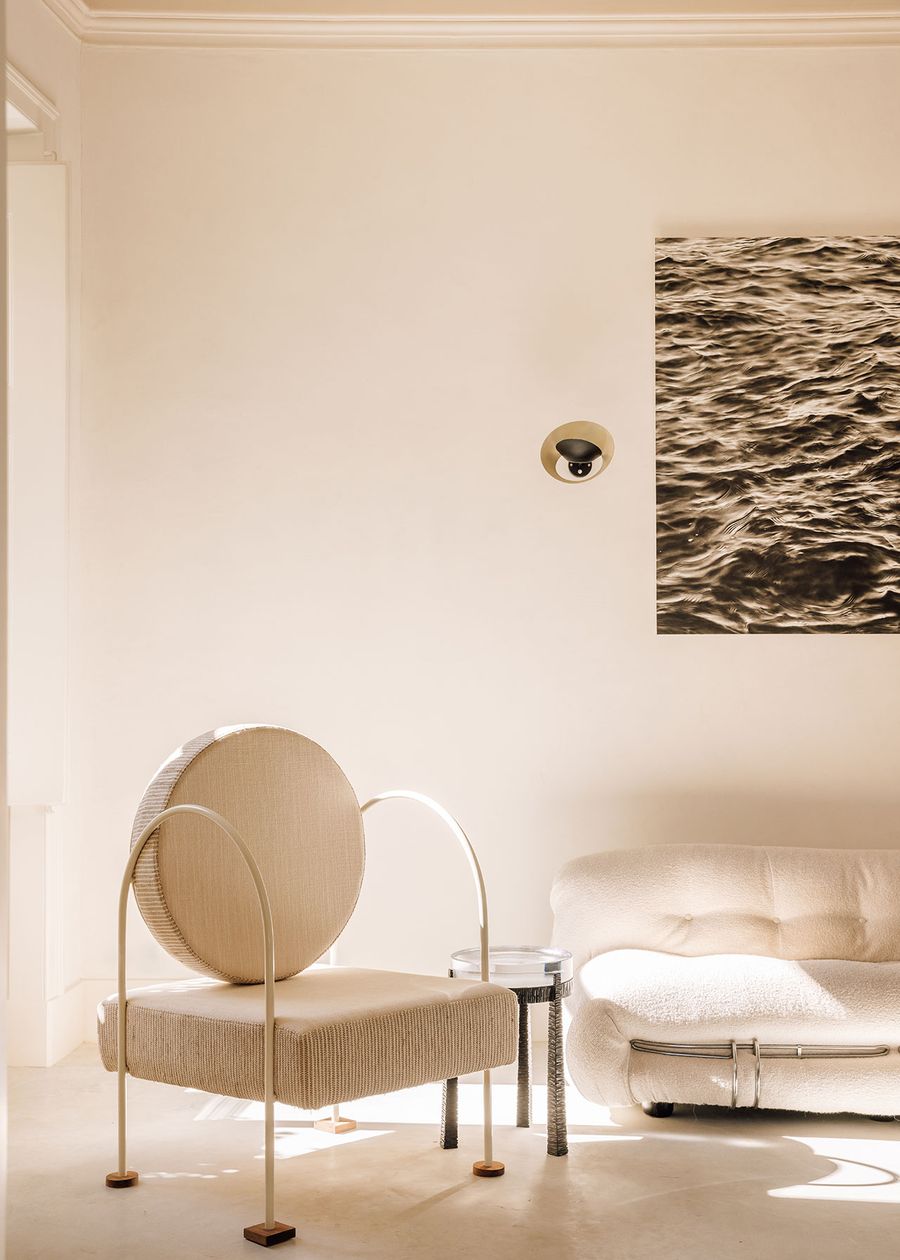
‘Capsule Armchair’ by Studio Gameiro; ‘MIRRA’ Black Side Table by HAMREI; ‘Soriana’ sofa by Afra and Tobia Scarpa; ‘Saturn Wall Sconces’ by Serge Mouille; Artwork: ‘Seas’ by Teresa Esgaio.
Photography by Francisco Nogueira.
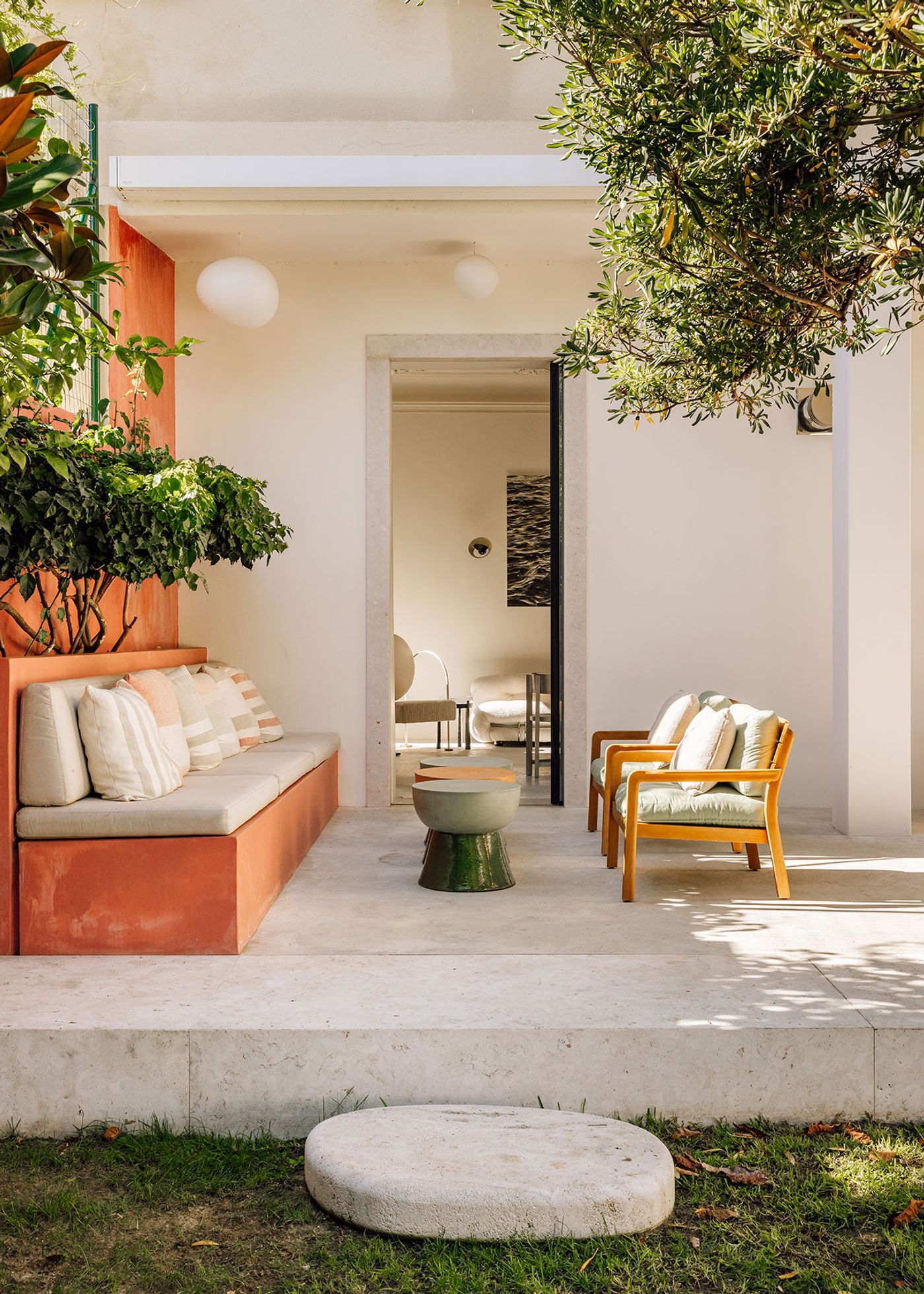
Photography by Francisco Nogueira.
The apartment’s spacious courtyard, featuring a dining terrace and a lush garden was completely reimagined as an oasis of outdoor living with a swimming pool standing out as the focal point thanks to its vibrant tiling. Here, the designers experimented with colour to achieve the perfect hue for the tiles, blending cobalt blue with Klein Blue to evoke water in its most profound natural element. Handmade by Portuguese manufacturer Viúva Lamego, the tiles—each one individually designed and 3D-modeled to accommodate the pool's unique features, including its infinity edge—create a textured surface that immediately conveys a sense of calm, inviting thoughts of long, lazy afternoons.
Purposefully visible from various vantage points throughout the apartment, the pool embodies the project's commitment to blending tradition with modernity, craftsmanship with innovation, and serenity with vibrancy. Much like the rest of the apartment, it serves as a reminder that thoughtful design can transform a space into a living work of art—one that reflects both its storied past and its contemporary surroundings.
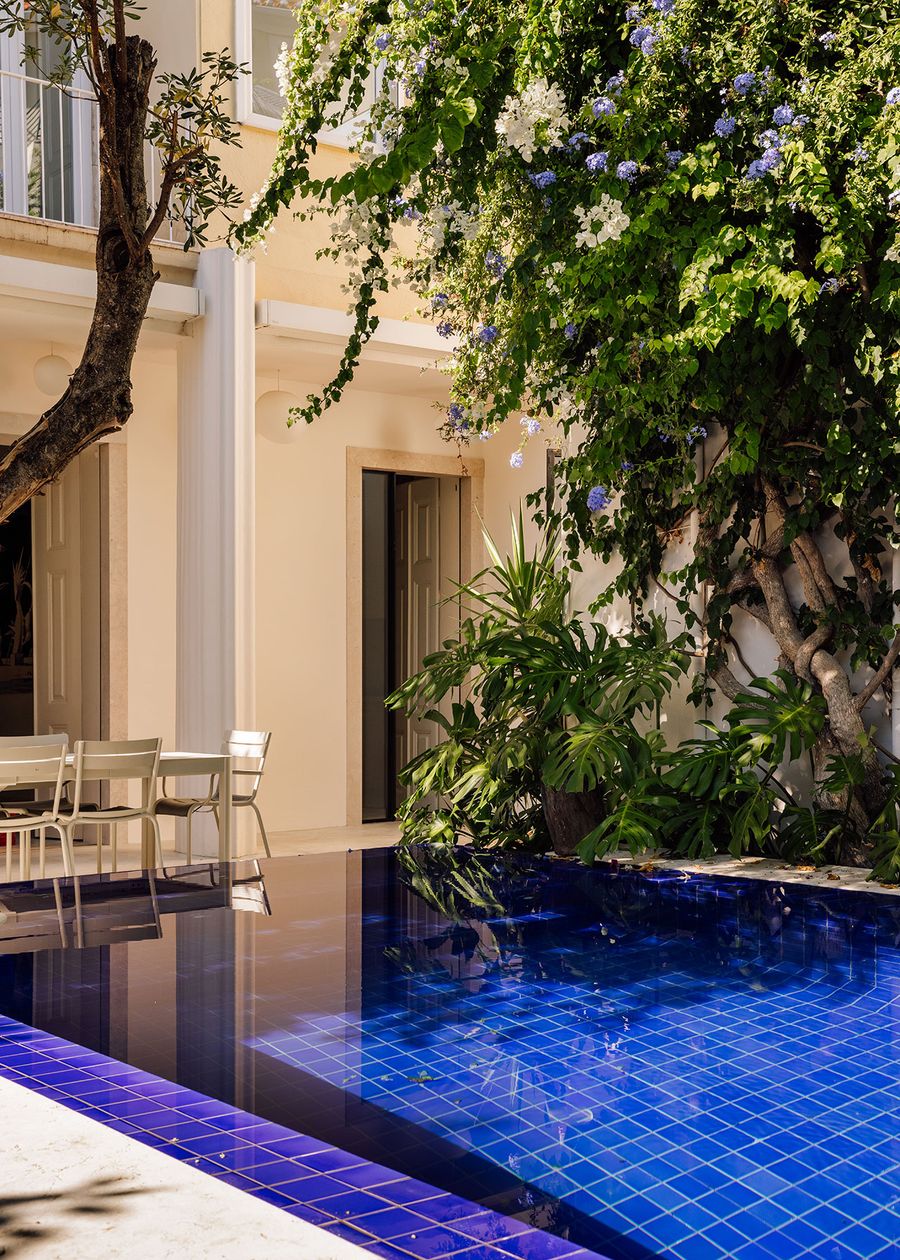
Photography by Francisco Nogueira.
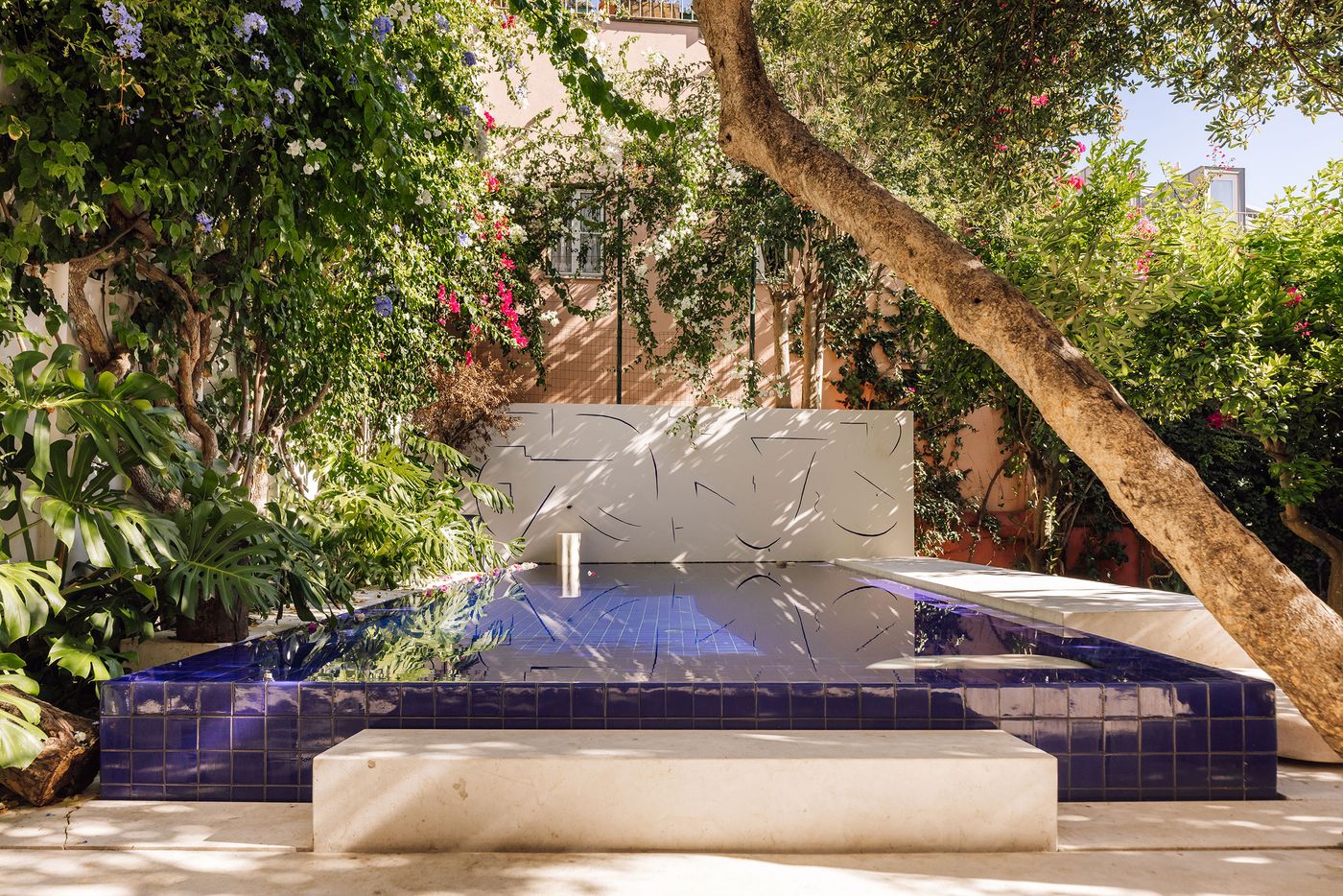
Photography by Francisco Nogueira.
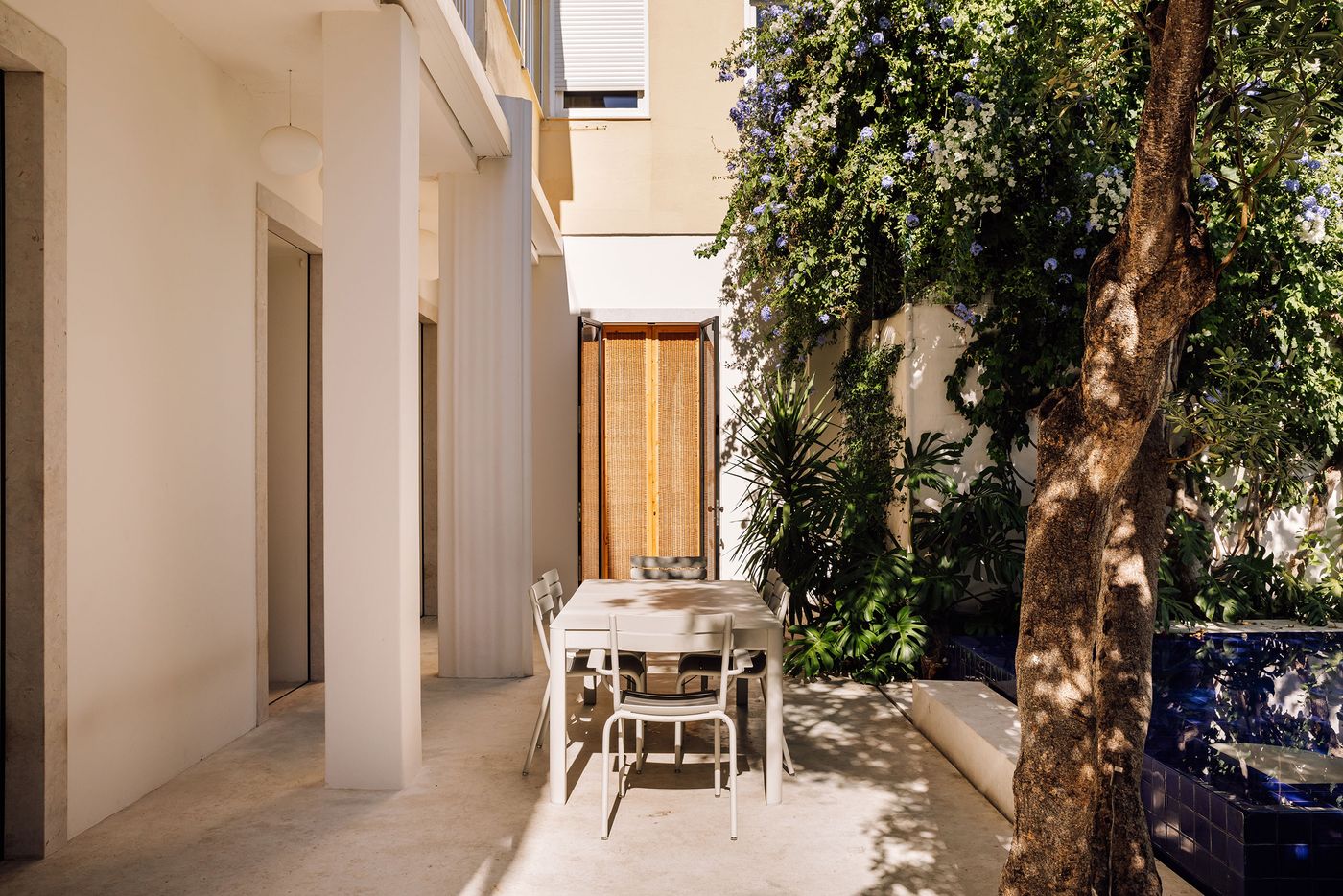
Photography by Francisco Nogueira.
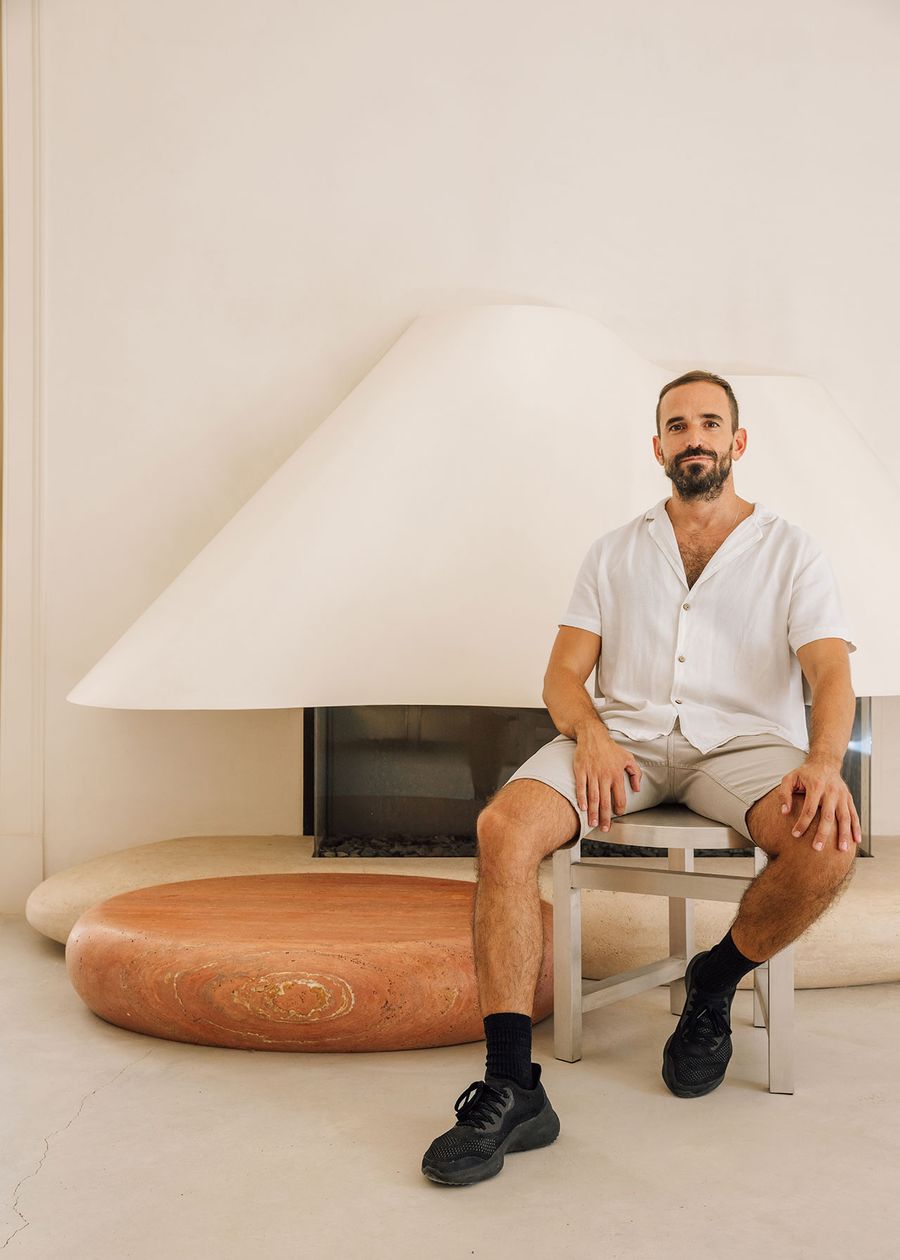
Architect João Gameiro, Founder of Studio Gameiro.
Photography by Francisco Nogueira.
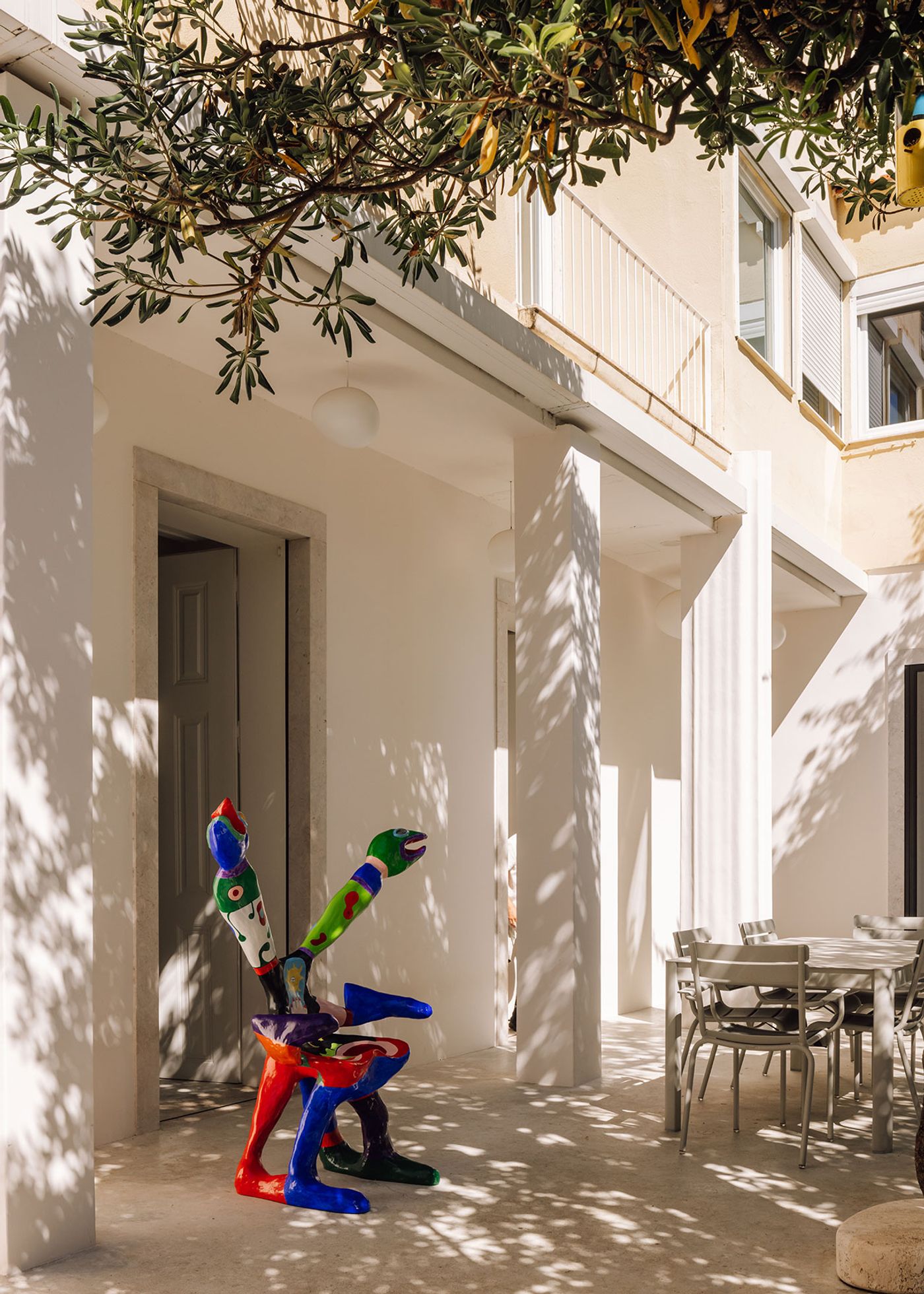
'Snake chair’ by Niki de Saint-Phalle.
Photography by Francisco Nogueira.
